#i do have several ideas as to why this post in particular was targeted but i’ll keep them to myself
Explore tagged Tumblr posts
Text
The Swiss Cheese Model of Covid Prevention

An edited version of the swiss cheese model tailored towards the measures that you as an individual can take to minimize your risk of infection. Public health is ultimately what its name implies, public, but that doesn't mean you're powerless.
Covid prevention is not all-or-nothing. Think of it as risk reduction, rather than a binary.
Let's go through these step by step.
VACCINES
The current vaccines are meant primarily to reduce chances of severe illness, hospitalization, and death. They will reduce your chance of infection a bit--but not nearly as much as you might think. You should still get your boosters regularly, because avoiding severe illness is of course worth doing.
If you haven't gotten the updated monovalent vaccine yet, go get it. It is not a booster. Think of it as a new vaccine. It's targeted towards the XBB lineages, which are now the most common variants. Your last boosters were likely of the bivalent type, aimed at both the original Covid strain from 2020 and Omicron. The new vaccine is monovalent, meaning it targets one family in particular.
Some studies suggest that the Novavax vaccine, which is a more traditional protein-based vaccine, is more effective and safer than mRNA vaccines, and offers better protection against future variants. Of course, the data we have so far isn't 100% conclusive (the last paper I linked is a preprint). Make of these findings what you will, just something to keep in mind. The new Novavax vaccine's availability is still limited, especially outside of the US.
MASKS
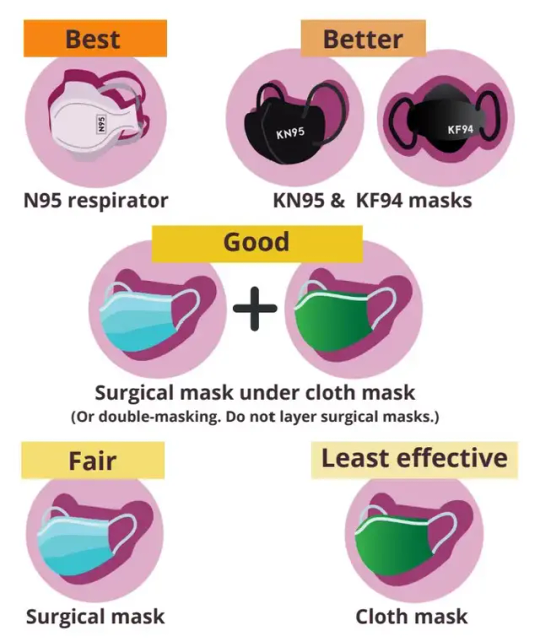
Masking is one of the most effective ways to protect yourself. While it is true that masking and reducing Covid transmission protects those around you, the idea that masks can't protect the wearer is outdated information from the early days of the pandemic when medical authorities refused to acknowledge that Covid is airborne.
The key to protecting yourself is to wear a well-fitting respirator. You want to minimize any gaps where air might leak out. If your glasses get fogged up, that's a sign that air is leaking.
Headbands will always have a tighter fit than earloop masks (and therefore provide better protection). However, you can use earloop extenders to improve the fit of earloop masks. You can find these online. Your comfort in wearing a mask is important, but there are options for compromise.
The above graphic doesn't include elastomeric respirators. While some (like the Flo Mask) are expensive, they can be much more affordable than buying disposables--look for P100 respirators at your local hardware store, but make sure it fits your face well.
For more general information, see this FAQ. For mask recommendations (NA-centric, sorry!), see my list here or Mask Nerd's YouTube channel.
For situations where you need to hydrate but don't want to take your mask off, consider the SIP valve.
Not even N95s are foolproof (N95 means it filters at least 95% of particles--with the other 5% potentially reaching you). Most people will likely not have a perfect fit. There will be situations where you'll have to take your mask off. The key is risk reduction, and that's why the Swiss cheese model is crucial.
If you can't afford high-quality masks, look for a local mask bloc or other organization that gives out free masks. Project N95 has unfortunately shut down. In Canada, there's donatemask.ca.
AVOID CROWDED INDOOR SPACES
This is rather self-explanatory. Indoor transmission is much, much, much more likely than outdoor transmission. If it's possible to move an activity outdoors instead, consider doing so.
If possible, try going to places like stores or the post office during less busy hours.
Viral particles can stay in the air for a considerable amount of time even after the person who expelled them has left. Do not take off your mask just because no one is currently present, if you know that it was previously crowded.
A CO2 monitor is a decent proxy for how many viral particles may have accumulated in the air around you. The gold standard is the Aranet4, but it's expensive, so here are some more affordable alternatives.
VENTILATION AND AIR FILTERS

Ventilation is effective for the same reason that outdoors is safer than indoors. If it's warm enough, keep windows open whenever possible. If it's cold, even cracking them open occasionally is better than nothing. Try to open windows or doors on different sides of a room to maximize airflow.
HEPA air filters can significantly reduce viral transmission indoors. Make sure to find one suitable for the room size, and replace the filters regularly. You want to look for devices with HEPA-13 filters.
You can use websites like these to calculate how long it takes for a device to change all the air in a room. Remember what I said about viral particles being able to hang around even after people have left? If an air purifier provides 2 air changes per hour, that means that after 30 minutes, any potential viral particles should be gone.
If you can't afford a commercial air filter, here's a useful DIY filter you can make with relatively simple materials. The filtration capacity is great--but due to being built with duct tape, replacing filters will be a challenge.
If you have to hold meetings or meet with people at work, having a smaller filter on the desk between you will also reduce chances of infection.
As a bonus, HEPA filters will also filter out other things like dust and allergens!
REDUCE LENGTH OF EXPOSURE IF EXPOSURE IS UNAVOIDABLE
Viral load refers to the amount of virus in a person's blood. If you've been exposed to someone with Covid, how much you've been exposed matters.
You might escape infection if the viral load you've been exposed to is very small. Or, even if you get infected, there will be less virus in you overall, leading to milder illness--and crucially, a lower chance of the virus penetrating deep into your body, creating reservoirs in your organs and wreaking long-term havoc.
A low viral load is also less contagious.
This is the same reason that wearing your mask most of the time, but having to take it off for eating, is still much better than not wearing your mask at all.
RECHARGEABLE PORTABLE AIR FILTERS

You might attract some odd looks. But if you're at high risk or just want to be as protected as possible, small portable air filters can help. Try to find models small enough to take with you on public transportation, to school, or while traveling.
These devices will be far too small to clean the air in the whole room. The goal is to have it filter air in your immediate vicinity. Be sure to angle the device so that the air is blowing in your face.
Unfortunately, rechargeable devices are much rarer and harder to find than normal air filters, and many are also expensive.
The best option at the moment, apart from DIY (which is possible, but you need to know what you're doing), seems to be the SmartAir QT3. The size and shape are a bit clunky, but it fits in a backpack. Its battery life isn't long, but it can be supplemented with a power bank.
NASAL SPRAYS
There's some research that suggests that some nasal sprays may be effective in reducing risk of infection by interfering with viruses' ability to bind to your cells.
These sprays are generally affordable, easy to find, and safe. The key ingredient is carrageenan, which is extracted from seaweed. So there are no potential risks or side effects.
Be sure to follow the instructions on the packaging carefully. Here's a video on how to properly use nasal sprays if you've never used them before.
Covixyl is another type of nasal spray that uses a different key ingredient, ethyl lauroyl arginate HCI. It also aims to disrupt viruses' ability to bind to cell walls. Unfortunately, I think it's difficult to obtain outside of the US.
CONCLUSION
None of the methods listed here are foolproof on their own. But by layering them, you can drastically reduce your chances of infection.
The most important layers, by far, are masking and air quality. But you should also stay conscientious when engaging with those layers. Don't let yourself become complacent with rules of thumb, and allow yourself to assess risk and make thought out decisions when situations arise where you might have to take off your mask or enter a high-risk indoor area, such as a hospital.
Remember that the goal is risk reduction. It's impossible to live risk-free, because we live among countless other people. But you can use knowledge and tools to keep yourself as safe as possible.
1K notes
·
View notes
Text
a reminder
i haven't been posting much here in a few months. part of that has been work-related - putting a lot of my time into illustration projects that i can't share, & also doing a lot of prep for a local Hanukkah market i both co-organize & vend at (which happened this past weekend). i tend to use this space as a sort of less-formal gallery, only posting work i consider "finished" or reblogging things related to projects i'm involved in. in the past i've been more talkative & more apt to share WIPs & personal things on my other social media (Twitter, Instagram, Bluesky), which is still true even though i've had to take several steps back from some of those platforms lately for my mental health.
all this is to say that if you only follow me here, you haven't seen me make any kind of statement about the crisis in Israel/Palestine, because that isn't how i've been using this particular site. i do not think of my art as apolitical & i am not secretive about my politics, but over & over again, i find myself followed by people who appear to be shocked to learn that i am proudly & actively anti-Zionist. i have been for my entire adult life. as a Jewish artist making visibly Jewish work, this puts a target on me, not only from garden-variety antisemites but also from fellow Jews who feel "betrayed" by my solidarity with Palestine & threatened by my vocal opposition to colonialism, apartheid & genocidal violence (as well as the very idea of ethnostates). in fact, the harassment & abuse i receive online is primarily from Zionists, which is not something i would have ever expected with so many white supremacists & neo-Nazis crawling all over the current internet!
so, this is just me cleaning house now & again. i don't feel the need to post signs shooing away folks who should be getting that message very easily from my work (if you hate queer, trans, fat, disabled & Jewish people i truly don't know why you'd follow me), but it's very easy for Zionists to see much of my Jewish-focused work & decide they like it, only to turn verbally abusive when they realize i don't share their views. here's your sign! if you want to bail, do so quietly & civilly like an adult please. thank you.
236 notes
·
View notes
Text
Why Sunny’s Halloween costume is a mummy instead of a vampire
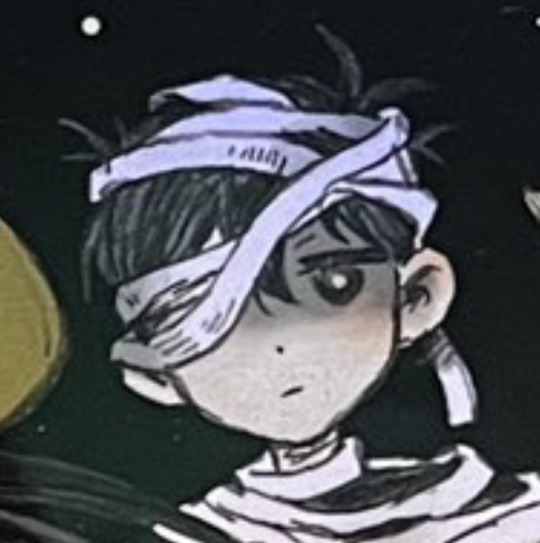
Okay strap in guys this is a long one
(Under a read more because I have lost my mind)
(Also for some stuff I’m using Wikipedia as a source this isn’t a professional essay or anything)
Something I have noticed with Omori fans is that, much like with other fandoms, people like to assign fun Halloween monsters to their favorite characters. For a character like Sunny, I have noticed that many people opt to make him a vampire, which is a choice that seems quite understandable. The idea of the modern vampire can be traced back to many different authors, the most popular one in the minds of most being Bram Stoker’s Dracula, which was published in 1897. Some of the visual and behavioral trademarks of a vampire has to do with things such as aversion to sunlight, pale skin, fangs, and the need to feast on the literal blood of others to stay alive. Vampires have always been considered undead, which aligns with their history throughout folklore; there were several instances where corpses were staked after being accused of vampirism.
Reading this, its easy to see why fans would assign a character like Sunny to the idea of vampires based on all of the common traits of vampirism. However, while I do enjoy AUs and such of a vampiric Sunny, I disagree with this common interpretation and instead propose the idea of Sunny being associated with a different kind of undead monster: the zombie.
(“But Kaun, didn’t you say in the title of this post that Sunny is associated with mummies?” Yes, but we’ll get there.)
The origin of the zombie can be traced back to several different sources throughout the world, the most well-known one being Haitian folklore during the 19th century. Regarding modern depictions, popularized by the film Night of the Living Dead, zombies tend to be slow, rotting, human undead (while it must be noted that undead animals isn’t particularly uncommon either). Much like vampires, zombies need to consume humans to survive, but the difference is that, while vampires only need blood in most depictions, zombies tend to eat all parts of the body. The idea of the brain being the specific target is something that’s only come up within the last fifty years throughout pop culture; adding to these newer additions, it was only within the last twenty or thirty years that the idea of the running zombie was introduced and subsequently popularized.
So what does any of this have to do with Sunny?
Well, thought Omori, we are shown clear evidence of why the idea of the zombie resonates with his character. The most obvious example is with Hellsunny, who can be found throughout the entire truth sequence, in some parts of Black Space, and in a very particular cutscene in the Hikikomori Route.


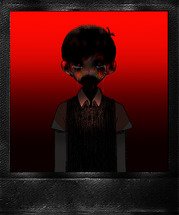
Now, while its easy for us to assume things from the POV of Sunny himself, sometimes its important to take into account the intent of the creator in order to interpret things such as this. So, once again, why a zombie?
Well, the choice of the zombie is quite obvious to me: the fact it is commonly referred to as the living dead. Now what does this allude to regarding Sunny? It most likely correlates with his emotions in the wake of Mari’s death, especially considering he’s the one who killed her in the first place. It is commonly said by people who have experienced the loss of a loved one feel as if they’re just drifting through life after their passing, and the same can definitely be said for Sunny. At the time the real world sections of the game take place, its been four whole years since the incident had occurred, and Sunny has both figuratively and literally wasted away in his own home. Characters comment on how he seems very skinny and/or frail, and how he clearly hasn’t been taking care of himself. In a way, its like a part of him died alongside Mari.
This is where we get to what some would consider to be an extension of the zombie archetype: the mummy.
Regarding its depiction in horror since the history of real mummies is an entirely separate conversation, the modern depiction of the (male) mummy can be found dating back to the 1932 film The Mummy. While most historical, real life mummies had their organs removed before burial, the mummy from the film (named Imhotep) was deduced to have been buried alive after it is discovered that its organs had not been removed at all. Now while the rest of the film’s plot isn’t quite as relevant to our analysis, I believe these details are important to note. The idea of the mummy being something sealed away, only later to be awoken again as some kind of living dead, is very interesting considering the parts of Omori that make this comparison to Sunny. The allusions to the idea of Sunny’s own home being some kind of coffin or tomb adds to these ideas.
This is why I think the vampire comparisons simply do not fit. The idea of the vampire inherently implies that the afflicted needs to take something from others in order to survive, and while the same can be said about zombies it must be noted that within recent years the idea of a kind zombie has been slowly making itself known. Additionally with mummies, aside from the blatantly orientalist bullshit regarding its history in pop culture, don’t tend to be depicted with having to consume any physical part of the human body (but physical violence in general is still on the table for them. They tend to be depicted as more on the level of vampires in terms of their intelligence).
In contrast, the living dead (referring to both zombies and mummies) tend to be much more passive. Most don't go out of their way completely to hunt humans, only hunting if one crosses their path—mummies even more so, with them not even needing human flesh to maintain themselves. When not hunting, these monsters tend to just... exist, not doing much of anything at all. They don't expend energy on actively looking for what they need to survive, instead opting for what they need to find them, wasting away all the while. And the thing is with zombies: they rot. They decay, bound by more realistic things than mummies are (which tend to be sustained my more magical elements in pop culture).
While the idea of having to actively go out and hurt others to sustain yourself is very interesting, when specifically regarding Omori’s canon, it doesn’t quite fit in line with Sunny’s character and his arc. In contrast, him neglecting his own needs and wasting away is more in-line with all of that, which is why he’s more commonly depicted as being a zombie or a mummy by official material.
I know this post is extremely long-winded, but I think this kind of analysis is very fun. Additionally, you don’t have to take my word as gospel, either. I enjoy AUs where Sunny is a vampire, since he’s in a position where he has to violate his own morals in order to sustain himself. I think it acts as a very interesting way to deconstruct his character, and to push him to his limits (including the brink of death if he refuses to hunt).
#rambles#omori#omori sunny#Omori analysis#I have clearly lost my mind and need to be sent to the nearest mental facility at once
277 notes
·
View notes
Text
SasaMyaa FujiSai Event (afternoon) Report
So! Today I attended the afternoon part of the SasaMyaa "Fujisai" event, a kind of post-Graduation Movie event to look back on it and have fun with the cast, which included the VAs of Sasaki, Miyano, Hirano, Kagiura, and Tashiro and Kuresawa as well. For ease of readers' understanding, I'll use the character names for the VAs throughout this report.
The stage (Yamano Hall, in Yoyogo, Tokyo) was set up to look like an actual festival, with little booths for games around the stage. This will become relevant later XD The audience was overwhelmingly women, but there were a few guys there too (including a few clearly there on their own as fans and not as boyfriends/husbands to their fan-wives).
The event opened with a small video recap of the movie, and then Tashiro and Kuresawa came out to introduce everyone as the MCs for the event. There was a huge monitor over the stage, through which were streamed live feeds of the actors (ostensibly for closeups so that the people in the back could get a good look at the stage, but also probably for future DVD releases).
All the actors introduced themselves, but when it came to Hirano's VA's turn to introduce himself, he shouted "Hirano~!" as a prompt for the audience. Except the audience had no idea what we were supposed to respond with (Taiga???), so he was greeted with DEAD SILENCE. Poor guy XD But then after a brief discussion of why he bombed so hard, Kagi's VA decided to try it too, and "Kagiura~!" was greeted with "Akira~!" from the audience XDDD He then explained that he'd really wanted to do a call-response with a different phrase, so we all let him say, "Hirano-san is so…" and then we responded with, "…nice!" He did this several times throughout the event--Kagi's VA is very clearly the biggest KagiHira shipper out there XD
The next segment was spent discussin favorite scenes from the movies, decided in pairs (SasaMyaaand KagiHira, and then Tashiro and Kuresawa chose by themselves). This was made even better because, in MST3K style, the guys would riff on the scene while it was being played on the monitors lol. Sasaki's VA in particular loved lampooning his own performance. The favorite scenes were as follows:
1) SasaMyaa: the opening scene on the train platform 2) Kuresawa: Miyano and Satoko's conversation in the park 3) Tashiro: Sasaki summoning Miyano to the empty classroom after he got his acceptance letter 4) KagiHira: the very last scene with the smooch in the committee room, but SPECIFICALLY the crumbs of Kagi and Hirano you get in that scene
The next segment was UPCOMING NEWS!
Sanrio collab! I know zilch about these characters except that Hello Kitty is paired with Ogasawara, and that feels Correct. (Dec 18 to Jan 8)
Illustration Exhibition for SasaMyaa/KagiHira + Yurukyun BL from gene pixiv (Dec 23 to Jan 15)
The stage play is going to stream on U-next! It'll be a lot easier for people to see it now, and I'm hoping that means a DVD release is right around the corner. It deserves it!!
Then it was TIME FOR SOME GAMES. The object was for each of the four main cast members to play each of the three games for 30 seconds each, 90 seconds total, and whoever got the most points in each game in total would win. The games were:
1) Super Ball Scoop (scooping up as many little rubber bouncy balls from a bucket of water using a scoop made of tissue and ergo prone to breaking after just a few scoops) 2) Ring Toss (toss rings onto a stake) 3) Shooting (use a little cork gun to knock over targets) [one extra challenge here is that the targets were all color-coded in the characters' colors and you were only supposed to knock over your own character's targets--except Miyano's blue and Kagi's teal are VERY SIMILAR COLORS so the VAs were whining about not being able to tell them apart XDDD]
All in all, these were the final totals after everyone's attempts: Miyano: 33 points Kagiura: 65 points Sasaki: 83 points Hirano: 64 points
A clear win for Sasaki's VA XDDDD
The next corner was a weird goofy 'fortune telling' corner where Tashiro and Kuresawa's VAs pretended to be fortune tellers for the two couples, except the VAs weren't playing their characters, they were just randomly improving being some kind of couple, idk XD the KagiHira segment went totally off the rails and resulted in Kagi and Hirano's VAs rushing each other on stage into a passionate hug, which you can understand the audience was THRILLED by XD
And last but not least for the event was…an original short story live reading. This was brand new content, performed live in person. ABSOLUTELY FANTASTIC.
The setting was one month post-graduation (so a bit before current canon, but not too much), and it opened with Miyano and Kuresawa waiting for Tashiro to meet up with them. After Tashiro arrives late from helping an old lady carry some heavy bags home, they recall the previous year's cultural festival (aka their second-year festival, Sasaki and Hirano's third-year festival).
Elsewhere, Sasaki and Hirano are hanging out, having run into each other. Hirano asks what Sasaki is up to, he says he's killing time to meet up with Miyano for a date later--what about Hirano? Hirano is, of course, cagey, but says "something along those lines." They too recall the previous year's cultural festival and how Tashiro had spilled juice on some cardboard boxes, sending Miyano running to them looking for spare cardboard boxes they could use.
Hirano had tried getting in contact with Hanzawa to find out where more boxes were, but he was out of reach, which really ticked Hirano off. Miyano "casually" mentioned reading in a BL manga recently that getting a hug from someone was a great stress-reliever, as it triggered a release of endorphins and made you feel much calmer. Hirano thinks this is bunk and goes off to look for Hanzawa himself.
Left alone, Sasaki brings up all the stuff he's been having to do to prep for this festival…and booooyyy has it really heaped a bunch of stress on him, and does Miyano think that a hug might help? It sure would be nice…
Just as he's about to laugh it off as a joke, like usual, Miyano grudgingly agrees, if Sasaki really is that stressed.
Back in the present, Miyano recalls this moment himself and squeaks.
Hirano gets a text (from presumably Kagi) and parts ways with Sasaki, telling him "Say hi to Miyano for me." When he meets up with Kagi, Kagi asks if he's been waiting long, and Hirano brushes him off, saying, "Nah, I was just talking to Sasa--er, an old classmate of mine." Good for you, Hirano; you've finally learned to avoid triggering Kagi's jealousy unnecessarily. Gold star!
Hirano mentions remembering that previous cultural festival, and Kagi recalls it too--especially the part where he'd heard that hugging someone could help reduce their stress and had taken his chance with Hirano then. When Hirano had been confused (but not pushing him away) about why Kagi was hugging him, Kagi had explained that it was part of their 10-second-touching time, doing the countdown and everything (bruh idk why but it did something to me finally hearing actual mention of that rule in the characters' voices! Felt like it's closer to being animated, even though it's definitely going to take some time…)
The main thing I took from this short story was: KAGI AND HIRANO STILL AREN'T DATING IN FUCKING OCTOBER??!?!?! FUCK ME.
Aaaand that was about it! I can't attend the evening show, but I'm excited to hear what happens there! Hope you enjoyed this little peek!
62 notes
·
View notes
Text
Eveline, the Connections, and the buried D-series lore
A surprising number of unused text files can be found by datamining the RE7 game file (I found next to nothing in RE8, for comparison). Many look to come from an earlier version of Mia's sequence on the tanker, which I may get to posting about those later ‒ but by far the most fascinating are a series of three files about the the E-series project, adding names and a whole tragic backstory to a couple of humble key items that are still in the game: the D-series arm and head.
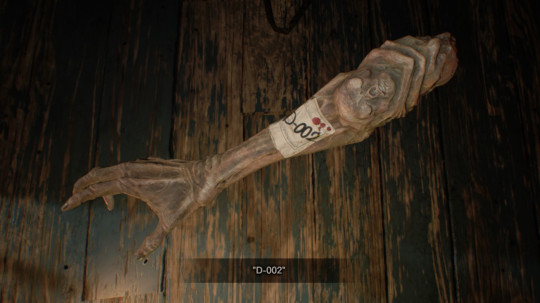

These three documents were presumably earlier drafts of those you can still find in the final lab, though they contain a number of details missing from the final game. I'll share all three below, but we'll start with the second, because it's by far the most interesting.
Biological Weapons Development 2 We've decided that the biological weapon should look like a young girl. That way it will be easy to slip it into groups of, for example, refugees. In early ■■■■, 1999, Dr. Olivia ■■■'s team infected a human embryo with ■■ from ■■■■, creating four prototypes. These were named, Dana, Dahlia, Darlene, and Dorothy. The D-Series was able to control the thoughts of others by making them ingest a mold-like secretion. The initial symptoms caused by this secretion are visual and auditory hallucinations, and ■■■■. The secretion also erodes the target's cerebral ■■■. As the infection progresses, the target develops strong feelings of friendship towards the girls, and actively seeks to serve them. It is also possible for the secretion to fuse with the target's somatic cells, causing mutations in the body's physical structure. D-001 Dana Deceased (■■■■) D-002 Dahlia Deceased (Decrepit at 319 days) D-003 Darlene Deceased (Infection) D-004 Dorothy Disposed of due to poor performance D-005 Dolores Suicide D-006 Diana Killed by D-005 D-007 Daniella Killed by D-005 D-008 Doris Deceased (■■■■■■) E-001 Eveline Stable [Progress under observation]
(Excuse the slightly-wonky table at the bottom ‒ it's the best I could easily do for tumblr.)
There's a real SCP vibe to all those clinical details and tantalising redactions ‒ far more is redacted in these early versions than in any file that made it into the game. What really killed Dana and Doris? We don't know, but the idea of causes worse than what's reported for other subjects is nasty stuff.
The most striking implication in this list is the story of poor Dolores, who killed two of her sisters (Dolores and Diana, D-006 and 7) before killing herself. We don't know why or how it happened, but Dolores was D-005, which is a number you might have seen before:
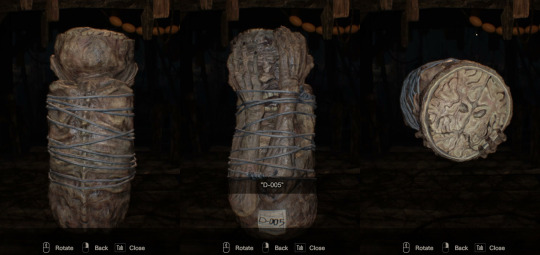
Well, shit. That poor damn thing.
The D-series arm belonged D-002 ‒ Dahlia, who was apparently 'decrepit after 319 days', so very likely affected by the same rapid aging as Eveline.

You find the arm attached to a horrifying corpse-doll-thing, the arm itself allegedly gifted to Marguerite by Eveline soon after her arrival. And speaking of this particular asset, the fact this arm seems to have tried to grow a whole new head even after being severed is a wonderfully creepy bit of detail.
I didn't find it strange that both components would have been on the ship with Eveline ‒ they're required components for making anti-infection serum, which might well be needed in transit or at their destination, and perhaps those components have a longer shelf-life than the serum itself. But the third document in the series tells us there was rather more to the fact that Eveline herself had that arm in her possession.
Biological Weapons Development 3 Eveline (E-001) has displayed remarkable results in performance tests against mice, ■■■■, monkeys, and humans. Finally, we have a biological weapon we can use. Unfortunately, her metabolic functions are lacking, meaning she still requires doses of ■■■■■. If ■■■■■ is not administered, the somatic cells age rapidly, and in a worst-case scenario ■■■■ may also occur. An attendant will be required to administer regular doses of ■■■■■ to Eveline. Having observed Eveline (E-001), we have noticed several interesting points: ・ Eveline has a tendency to regard the targets she gains control of as "family." It seems that gaining control of humans has a special meaning for her. ・ She treats part of ■■■■■■'s (D-0■■) corpse as a treasured possession. Perhaps she regards it as a memento mori from one of her sisters? ・ ■■■■■■■■■■■■■■■■. Perhaps ■■■■■■■■■■. Those infected with D-Series secretions can be treated with a special serum. The serum can be synthesized by ■■■■■■■■ing D-Series somatic cell tissue. In case of accidental infection, administer the serum as quickly as possible. Be aware, however, that the serum is only effective against mild infections. Administering the serum to those with severe infections can result in the infected cells coagulating and ■■■■, and may even result in death. Be sure to administer the serum at the appropriate time.
So apparently Eveline was in the habit of carting poor Dahlia's severed arm around with her, as some kind of twisted memento. Dahlia most likely died long before Eveline's creation, which does not make that detail less creepy.

Though it's much less interesting than the latter two, here's the first file in the series too:
Biological Weapons Development 1 This program started in 1997 with financial backing from ■ ■ ■ ■. The aim was to create a biological weapon that could take control of enemy groups without having to engage them in combat. This gives the program an advantage that differentiates it from previous biological weapon developments: it lets us turn our enemies into allies. Soon, those who once opposed us will voluntarily become our friends, serving us as required. With this program we can increase our allies while avoiding the costs associated with military engagements and having to deal with prisoners of war… The governments of ■ ■ ■ ■ and ■ ■ ■ may also be interested in this new program too.
Still no detail in any of these to explain why the two arms so very clearly attached to the D-series ""head"" were apparently not fit for purpose, but eventually you've got to just shrug and go with this stuff.
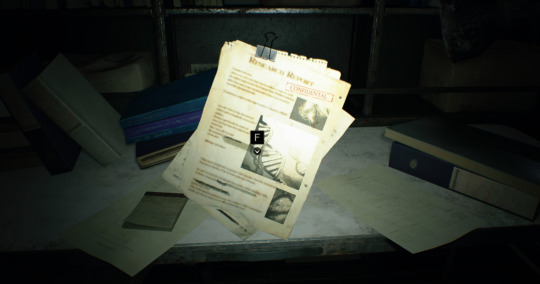
All these files are not so much "cut" content as older drafts that were accidentally left in the game, and they contradict the versions that did make it in in a few places ‒ for example, the draft version puts the project's beginnings in 1997, whereas the final version moves that date forward to 2000. But it's a real shame all that detail on the D-series was cut, because it adds so much context to elements that did make it into the finished game. The game still works without them, but I'd venture the whole picture is that little bit richer for knowing about them.
#Resident Evil 7#Eveline#The Connections#Resident Evil#RE lore#meta#RE assets#unused assets#cut content
66 notes
·
View notes
Text
Never thought the first thing I'd post here about tbosas would be Strabo Plinth analysis, but here we are
On a surface level, the most morally reprehensible thing Strabo does is provide the Capitol with munitions during the first rebellion and then move his family to live in the Capitol after its all over. Its the reason his relationship with Sejanus is so rocky, after all
But what I like about it is that if you really try to get into his head and justify it in the way he probably did himself, his choice to do this actually makes a lot of sense. From a perspective other than just "Oh, he did it because it was a good opportunity to make money, since District 13 was no longer providing nuclear weaponry for the Capitol." That's possible, but I think it's deeper than that
The way I see it, Strabo's decision to side with the Capitol was probably more of a survival strategy than anything. For him and his family
Strabo no doubt felt guilt over what he did. You could imagine him being completely cold and desensitised to the actions of the Capitol, I guess, but he had firsthand experience of what it was like in the districts whilst the war was happening. Even if he was living in a more privileged area. After all, if things were going to shit in the Capitol, it was probably ten times worse in even the best areas of the Districts. He saw the damage that the Capitol was causing and no doubt witness deaths over the events of the war, likely even deaths of people close to him
So, why would he help them?
Well, I think that if you look at the war from the perspective of the Plinth family, the outcome would most likely be a lose-lose situation. If the Capitol won, conditions would likely become even worse in the Districts. (Which ends up being the case.) But if the Capitol loses, well, what's the plan moving forward? He couldn't be sure of how well thought out the rebels ideas were, if they even knew what was going to happen, should they win. But things would likely become worse for a time due to a lack of proper structure. And the Plinth's, already living what seemed to be a perfectly fine life in District Two, would have a lot to lose, should shit hit the fan. Their munitions empire, for instance. Would a new, rebel controlled society even allow for independent munitions manufacturers? There's no telling.
These were likely the outcomes which Strabo was considering. And he wasn't only worrying for the wellbeing of himself and his company. If his munitions empire fails, if he loses his fortunes, well, he has a young son to care for. Say what you will about Strabo and Sejanus' relationship, a lot can be said about it, but Strabo seems to, on some level, want what's best for his son. Would Sejanus be able to thrive in a newly founded society, potentially without a munitions empire to back him up?
So perhaps, if you're looking at it like this, the best decision may be to side with the Capitol.
If the Capitol won, and Strabo had helped them, then it would be safe to assume that him and his family (his son in particular, consdiering young adults were being made targets of the Capitol's aggression and Sejanus would be reaching that age in only a matter of time. He couldn't have known that the hunger games were going to happen, however, he could have predicted that people of Sejanus' soon-to-be age range would face punishment if it all went poorly) wouldn't be faced with such severe punishment as other district people
So, even if it means turning his home against him, even turning his son against him, Strabo may see helping the Capitol as his only option. I can see no way that the Plinths wouldn't have suffered if he didn't.
His decision, whilst arguably immoral, was likely the only thing he could think to do in order to assure the safety of both himself and of those close to him. Like I said, he does care about Sejanus. That's shown in a few small ways, if you ask me. Particularly from the fact that when they did move to the Capitol, the main thing he wanted was for Sejanus to have a good education
If you're looking at it this way, and he did make the choice to help the Capitol out of a desire to protect Sejanus, it would make sense that the thing he would want once that protection has been assured would be something to allow his son to thrive (In theory.)
The whole thing likely came from a lack of any other reliable options and a need to assure Sejanus' safety, rather than purely for monetary gain. Even if the decision wasn't necessarily right, I think he did it for the right reasons
Ah, I love a morally grey character
#strabo plinth apologist/j#the hunger games#the ballad of songbirds and snakes#strabo plinth#sejanus plinth#suzanne collins#tbosas
93 notes
·
View notes
Text
Cosmo Backstory Post!
When I first made Cosmo’s intro post, I was nervous of putting too much about his backstory. I’m feeling braver now, and he’s had enough asks now to start hinting that he’s not entirely just a happy lil fluffball without a care in the world, so here, have the Forbidden Cosmo Lore. @kirbyoctournament
This post is completely optional for interacting with Cosmo! Most questions and interactions will still get lighthearted responses from him. The subject of his family is the only one likely to get a less happy response.
(WARNING! There’s lots of unhappy stuff in here. Before reading, please bear in mind the following content warnings: parental emotional abuse/neglect, sibling bullying, childhood trauma caused by the disappearance of a sibling, mental health struggles and divorce.)
Cosmo is the fourth of five siblings, born into the Poppy Bros Travelling Circus, which performs all over Dream Land. His mother was an acrobat, and his father was a clown. His older siblings were Soleil, Marx and Stella (half an hour older still counts as older!), and his younger sister was named Celeste.
The siblings’ mother played very clear favourites with her eldest, emotionally neglecting the rest of the kids while putting a lot of pressure on Soleil to succeed. This led to Soleil developing severe issues with anger, anxiety, jealousy and her own self esteem, which she would take out on her younger siblings. Meanwhile, their father was a pushover and went along with whatever their mother said. Marx would misbehave to get any scrap of attention he could, and would constantly and gleefully mess with Soleil to draw her attention away from the younger kids. Stella and Cosmo were the ignored middle children and began to spend time with their magician aunts instead, which led to them developing an interest in stage magic.
After meeting Kirby, Marx became fixated on the idea of becoming a ‘hero’ like them and going on exciting adventures, though purely as a way to get away from his home life, relieve his boredom, be able to do whatever he wanted without getting in trouble and get the attention he craved, not out of any desire to actually do heroic things. Eventually he decided to go about it in the worst way, and the family was suddenly down a member.
Marx’s disappearance affected everyone in the family very badly. The mother started becoming very controlling towards her children, especially little Celeste, trying to hide her own failings as a parent, and resisted even acknowledging Marx’s existence. The father became more withdrawn and began avoiding his family. Celeste, who had been a reasonably happy kid before, became very quiet and shy.
For Stella and Cosmo, the grief over the loss of their older brother hit them hard. They started having nightmares whenever they were too far from the Fountain of Dreams, and Cosmo in particular became very depressed, barely even reacting whenever some crisis threatened Dream Land even as his family were panicking. Not only that, but with their brother gone, there was nobody left to protect them from Soleil. They found themselves becoming her new main targets, and began purposely staying with their aunts as much as possible to avoid the bullying while refusing to say why.
This continued for a while, until one day they found out that Celeste had started to become a target too. While Stella was scared of getting involved at first, hearing that Soleil would go as far as to pick on a small child made something snap inside Cosmo, and he decided that he was going to do for his little sister what Marx did for him, no matter what. He managed to convince Stella, and the two began standing up for Celeste, which quickly spiralled into them pranking Soleil relentlessly to draw her attention away from the youngster.
On a more positive note, this drive to protect his sister helped Cosmo cope with his depression and become a bit more like his old self again. Marx also returned to Popstar not long after. While Cosmo initially resented his brother for abandoning him, Stella convinced him to give Marx a chance. It took a couple of years, a lot of arguing and many, many reassurances, but they eventually reconciled and became even closer than before. Cosmo would go on to become a bit too forgiving of his brother’s faults.
Stella and especially Cosmo quickly became the family’s new ‘problem children’. They started to rebel against their mother, ditching the ‘hidden twin’ gimmick that had always been part of their act, differentiating their appearances and performing as a double act so Cosmo could get some credit too instead of just being an uncredited, unacknowledged secret ‘assistant’. Their aunts, who were starting to become aware of how bad the toxic family dynamics were, supported them and helped them. Eventually, even the father had had enough of his wife’s controlling behaviour and started standing up to her, and their marriage fell apart.
The three youngest siblings are currently living with their aunts while divorce proceedings are happening. Soleil is staying with their father. Cosmo still has depression and anxiety, but is coping with it a lot better and has far more good days than bad. His protective streak has started to grow into wanting to help protect Dream Land, though it’s also partly because he’d get an excuse to hang out with his brother more. He’s usually very friendly and cheerful most of the time, but he’s very sensitive to perceived danger and tends to panic if he thinks someone is a threat. He also feels overshadowed by his older siblings and isn’t sure how to overcome that yet.
17 notes
·
View notes
Text
So, in light of recent fandom stuff, I feel like I do have things to add to the convo. (Under a cut because I wrote a lot.)
Criticism of media fundamentally serves a purpose. To me, that purpose is to look at the role media plays in the maintenance of hegemony. Which in turn helps in considering which perspectives might be missing and would be necessary in further understanding the world. Which in turn helps us to deconstruct our current understandings of the world and work towards better systems.
(Not to mention, it can be quite fun to do and read/watch, as least for me personally.)
I think criticising children's media in particular does involve a certain amount of finesse as well. You're working with material targeted at the young. Much of this media would be formative materials for them. And so one will have to operate with a more considerate view on how to navigate criticising the media in question. In my view, for a succinct criticism to be made, you have to understand the target audience it had been made in mind for, which often depends on factors such as age, gender, country of origin, etc. in order to understand why certain decisions were made. Only then can one adequately begin to unpack why certain decisions made within the media were made.
So, let's talk about Skylanders [1].
I think it is worth talking about the ways this franchise does incorporate militaristic imagery into its heroes [2]. The way racialised/orientalist understandings of certain peoples does affect portrayals of certain characters. It is equally worth talking about how this is not unique to this game series. That these are issues widespread among a lot of media of its genre.
I feel like most of the issues of the franchise being the way it is boils down to like, it more or less being produced in a hegemon which permits for the unquestioned use of 'militaristic' imagery, as well as racialised/orientalist tropes and imagery, in a children's game without it being called into question lol. After all, there are children who do frequently, in real life, deal with tanks and fighter jets and border police and similar things on a daily basis. To have a game wherein images of these things are used by the heroes, to have heroes who are named after actual military terms coined in the context of modern warfare (Air Strike comes to mind) is actually indicative of who the target audience of the games are! (Children who do not have to frequently deal with these things in their real lives.)
And I feel like what it is good to question here is the acceptance that audiences did have at, well, more or less having characters who did use these images and who are named after these terms of modern warfare more or less unquestioningly. At least, it is worth considering, if only to be made aware of what perspectives are currently absent from the picture being presented.
~
Tangentially related from the main point, but a few responses against claims of the Skylanders being a proper armed military have been along the lines of the Skylanders being more 'superheroes' than a military. And that is true; they do follow a model more similar to that of a superhero story.
But I do think that superheroes as a concept are equally worth criticising. If only because the idea of 'innately powerful being who has the power of arbiter of morality and who protects "their community"' is a character trope which can be used as a vessel for reactionary ideology. (Implications of a character being uniquely powerful and what it says about our views on gifts/talents/ability aside [3], unpack 'protect', 'morality' and 'community'.) To paraphrase a tumblr post I can't be arsed to dig up now, 'if the Avengers existed in real life I bet we'd all hate them' [4].
Within the context of Skylanders, I don't really think they fall into as many of these issues which do end up within quite a bit of superhero media. Several characters do avoid the idea of 'innate power' through having been superempowered by something else (magical explosion, tech suit, whatever), and it is worth pointing out how several characters in-universe are also members of peoples who had previously been marginalised, and many Skylanders had made a name for themselves as being freedom fighters in particular [5].
~
That being said... I find it to be missing the forest for the trees to tie a decade-old dead franchise to an ongoing military conflict using example tropes which are, frankly, not unique to the franchise. The truth of the matter is that a lot of boy-targeted media produced in Western nations for the intent of selling boys more toys have similar issues with their portrayals of military and police forces, 'heroic' figures, structures of power, ideas of 'power' and 'protection' in general. So on and so forth.
Most of these things, in my opinion, need to be criticised within the context of more examples and broader cultural trends. To use the light vs darkness example, one needs to talk about the prevalence of it as a trope in other media, and how it affects the portrayals of characters who are associated with darkness and designed with dark skin in particular, beyond simply one game series. This is so that people can more easily notice how it is a reoccuring pattern in media and it isn't a unique example. Which then lends credence to your argument that darkness' association with evil negatively affects the portrayal of racialised/racially-coded characters and that this trope's prevalence has roots in societal ideas around 'light' features (light skin, blonde hair) being associated with goodness, with darkness serving as a contrast.
Similarly, if one analyses the game within the context of its production, target audience, etc, I don't think it would be accurate to call it propaganda. Rather, I think what it is, is a game produced within a hegemon. Which people who exist within the hegemon take in with varying levels of like, 'being critical of'. I think the severity of the issue needs to be properly assessed in order to most succinctly criticise it. [6] And what it is, fundamentally, is a symptom of a culture.
~
My final point is that. Everyone. This is the neurodivergent website. A common symptom of neurodivergence is a tendency to phrase things somewhat awkwardly.
Harassment is never warranted.
What if I just moved to Jupiter to get more stupider?
~
[1] I win at tone shifts.
[2] Worth pointing out: the villains of the game have also employed similar use of militaristic imagery. [See: Glumshanks tank.] Genre is important, and this is a hack n slash. We are going to fight enemies, and hordes of them. (In turn it is worth thinking about the popularity of such games, the implications of this genre's conventions, etc. Blah blah blah ruthless critique of all that exists whatever.)
[3] Insert Jack Saint
[4] Insert Alan Moore
[5] It is worth also pointing out that there are also characters who did make a name for themselves via protecting people from 'bandits' and such, which like yeah. I think these sorts of generic enemies do have some classed implications when you think about them. However, one must also remember that these games were produced one after the other over the course of about seven or so years, and most bios were initially written as throwaway afterthoughts to give the characters a little spice. It would be difficult to therefore give a succinct analysis about many of their actual portrayals in lieu of meatier media (in the form of comics, books etc).
There's something to be said about how the material conditions the games were made under - that being of video game crunch in order to push it out to as many USAmerican [and broader global north] children as possible - did lead to the games being produced and written a certain way. (ie capitalising on normative heroic tropes and ideas without deconstructing them to a greater extent). Of course it did that; they were pushing these games out as fast as possible. Who has the time to construct revolutionary narratives in this context?
[6] For that matter, there is something worth criticising regarding fandom-blogging while trying to tie it to current military conflict. Definitely question the media one consumes. One must also remember that this is a dead game franchise with a small active fanbase, and while criticise it can be a meaningful thought exercise and expose one to a perspective they might not have considered before, this is also just a game. And there are real marginalised people out there who demand to be talked about as themselves, without being tied to fandom.
#tabby says something#skylanders#posting after a billion years#i had been too busy writing yuri to do much skyloser stuff but like. this necessitated discussion.
9 notes
·
View notes
Note
even without textual evidence id love to hear your thoughts on kotoko not killing anyone directly!! i never hear 10 theories, & especially not ones that dont revolve around her beating up the prisoners. if youre comfortable, i would love to hear your thoughts on my wife ~with love
Ahh so sorry for how long it took to me to answer this ask my brain has been gone for the past few days. But you're right! How could I pass up an opportunity to talk about Kotoko? She deserves so much more love than what she's given. Kotoko appreciators please interact I'd love to hear your thoughts.
So we already know I subscribe to this particular theory:
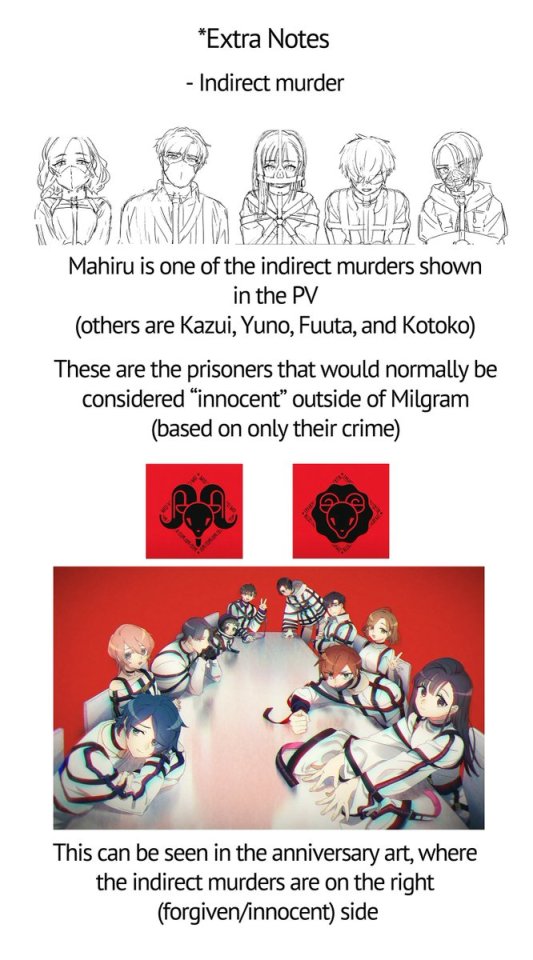
Since it serves as a extension of the parallels found in the prisoners. It also fits with Kotoko since she states she'd be an innocent person outside of Milgram:
Kotoko: [...]To defend and protect the weak, there’s always situations when you can't do anything else. I say again, what I did is, “facing an urgent and illegal infringement, an action taken out of necessity to protect the rights of myself and others”. You do understand what that means, right? Es: "Criminal law, the 36th paragraph, article 1. Justifiable self-defense." Kotoko: "Looks like someone has studied. So in reality, my case, if taken to the judiciary, will also be judged as justifiable defense.
(Kotoko you did nothing wrong so true so true!)
Though, I'll admit this doesn't outright confirm she didn't kill directly anyone. However, if we work back from the idea Kotoko commited an indirect murder then you start noticing a lot of weird details in her case.
— The Warehouse
First off, Kotoko didn't directly killed the warehouse guy. We know this because her actual victim died in a nearby street in Sendocho, Kyoto.


There is the possibility there's multiple murders underneath her belt but she hasn't mentioned it hereself:
Kotoko: I did kill someone. This is why I believe in the power of Milgram.
And, unlike other prisoners, Kotoko has no reason to lie about herself. She admires the prison and believe she's done nothing wrong. If she wants to become our fang then certainly she'd jump at the chance to mention all the villains she's defeated.
Which is amazing and everything but. . . if Kotoko's victim didn't die in the warehouse then why is it the climax of Harrow? It's obviously meant to be presented as her murder. Why are there so many strange details included in the warehouse scene too?
I pointed this out in a seperate post but there's three major strange details in the warehouse scene:
1). A car suddenly appears the second time Kotoko enters the warehouse.
2). Kotoko's outfit shifts midway through entering.
3.) Despite that, her cap still appears on the ground.
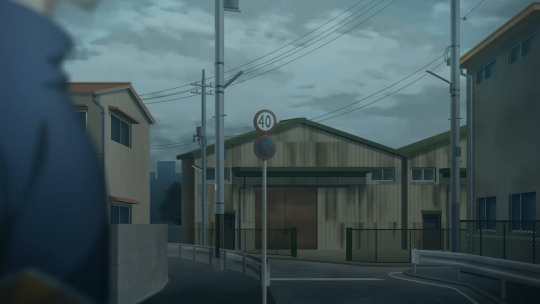
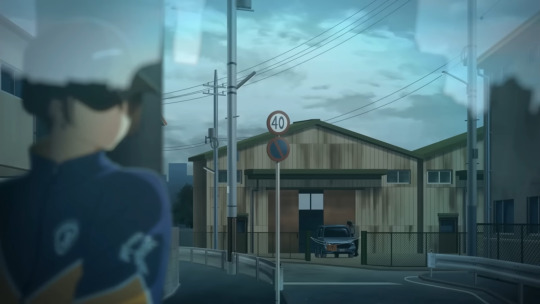
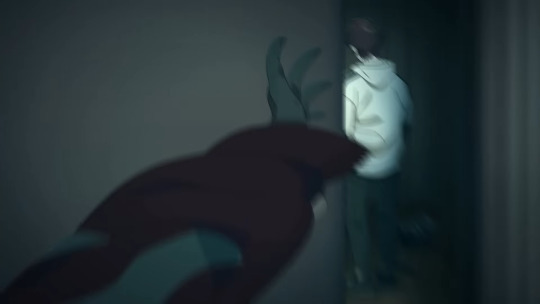
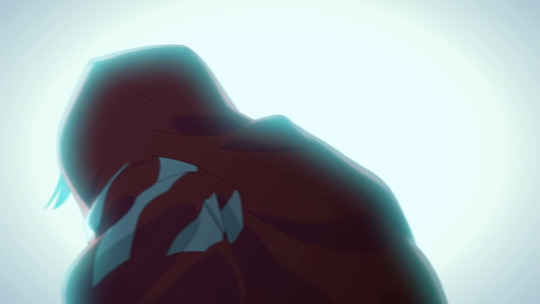

(I don't even think Takao, the warehouse guy, is even bleeding...! I've been told otherwise but I turned up the saturation and stared at the image like twelve different times but I think its shadow. Why is it obscure anyway??? Just make it outright!! Some of us have vision problems y'know!!)
I don't have any answers for why these details are here but it's weird. This is only time I can think of in S1 where the "real world" has muddled up details like this. (Apart from maybe Rei's change of eye colour which is more subtle than this).
Which isn't to say her victim isn't Takao. Again, it's the literal climax of the song and her wolf imagery comes out full stop while dealing with him. She's been hunting this guy down for possibly two years and he's done inexcusable harm to children.

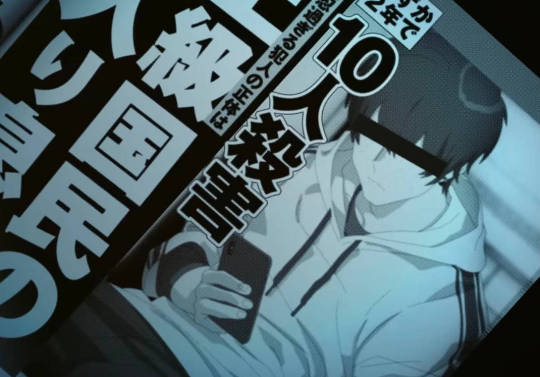
Several news article through Harrow Flash news: A girl's dead body was found near her home, presumed to be another victim of a killing spree targeting little girls
New evidence: tire marks, same as the marks found near where the girl's corpse was abandoned. The culprit seems to have kidnapped her by car, murdered her, and dumped her body near her home
The person who killed 10 people in two years was the spoiled son of an upper-class citizen. He ran over an elementary-school girl and she died, which may have been concealed due to his father's power
It also fits with her theme of protecting others as opposed to Mikoto's theme of protecting himself. Murdering a serial killer who's done inexcusable harm on this level can make it harder to punish her in the future. She did a very, very good thing by taking this guy down.
Her smile also matches up with the shot in Undercover where she's presumedly beating someone to death.
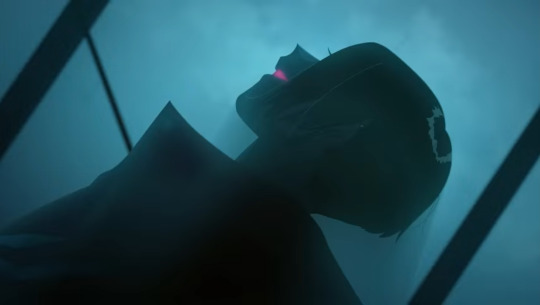

— The Alley way
If we're discussing a potential victim here then it's more likely to be Mikio Oshii, the man she beats up in the alley way. However, I'm not convinced of this either because it's never given full confirmation.
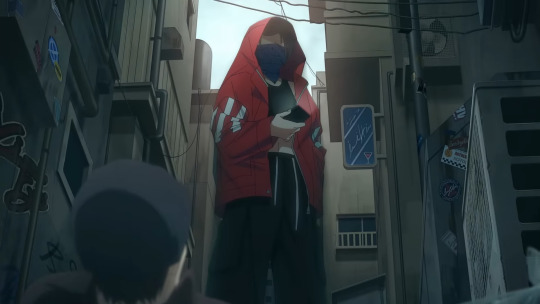
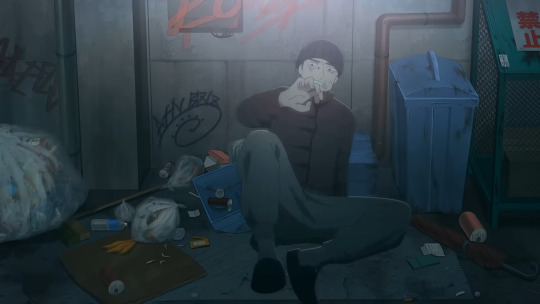
An article from Harrow: "Mikio Oshii, a man wanted for theft was found unconscious yesterday night and taken to the hospital, his face and stomach beaten up. Footprints of a man's sneakers were found at the site, and the police are searching for a male culprit."
(transmasc kotoko so true!! handsome boy!!)
It's possible he could've died later in the hospital—like, genuinely I believe it, there's plenty of evidence, and I don't have a direct argument against it—but for the sake of this theory I don't think this is the case.
Unless Mikio laid a hand on her prior, tracking down to corner a thief and beating him until he's unconscious wouldn't constitute as self defense. If this was the case then why not show the audience?
As for the indirect murder part, there could be a debate over whether a death caused later constitutes as murder but I don't think it'd be an interesting debate.
It's also a pretty tame murder in the context of Milgram. Kotoko "I defeat evil doers" Yuzuriha beat up an old guy, didn't even finish the job, and he died by blood loss. Not only is this the legal definition of murder (Kotoko had the intent to harm + the victim died as a result of her wounds), the literal children of Milgram have done worse. When Amane wanted to kill someone she atleast brought a steel pipe and aimed for the head!
However, this isn't to say her victim isn't Mikio. Atleast, not entirely. The alley way matches closest with the Sendoku street and beating up someone is presented as her murder. This scene is definitely important to understanding case.

—So Like, What Is Her Murder Then?
Haha... remember in my original post when I this theory was half-baked and had little evidence? I can croon all I want about how it's not Takao or Mikio but she had to killed someone, y'know? There's no other character in Milgram where you couldn't reasonably guess the victim based off of the first trial alone. I've also noted why it still could've been either of them too. This also isn't conclusive evidence she didn't directly or indirectly murder them either.
Personally, I think Kotoko's crime should be an extension of Milgram prison, similarly to Fuuta. Her judge/jury/executioner vigilante traits fts this already but I think it could go even further. I'm thinking she might've turned to a higher authority and they recieved a lethal punishment of some kind? That's kind-of just my shot in the dark through.
Kotoko's case interests me the most because of how simple is appears to be while having so many elusive elements. For instance, who're the two girls and the man with the hammer? One of the girl's could've been Kotoko herself too which makes for an incredibly interesting backstory. There's also this line in her voice trailer:
Kotoko: "From the begin I've never asked for your understanding! My actions, one by one, are bringing earth closer to peace. Useless Weaklings should just shut up and let me protect them!"
Which is strange because every voiceline happens before their time in Milgram. Who is she talking to and why does she need to defend herself while talking to them?
This conclusion is a bit of a mess but wow I'm really excited for Deep Cover. Recieving confirmation on anything is going to make me ecstatic. Inno Kotoko truther through and through I adore her.
#again really sorry how long this took to me!! graduating is beating me like a bloody pulp#there's probably some details I'm missing too boooooo#milgram#kotoko yuzuriha#꒰ ☁️ ꒱ ── warm regards‚ cinnamon
38 notes
·
View notes
Text
Y'all know how I've mentioned before that I like playing otome games? Well one of the games I played last month has been on my mind cause I keep thinking of how I could incorporate Yuu and some of the TWST boys into the story of that game.
I have no idea why my brain suddenly started doing this, but I figured I'd go ahead and make a post about it cause why not? 😂
Okay, so first off, the otome game that I'll be talking about is Winter’s Wish: Spirits of Edo, which I would recommend to anyone who likes otome games. While I wouldn't go so far as to say it's a favorite of mine since I didn't get super attached to any particular LI, I still enjoyed the game and thought it was really cute ^^
Anyway, this game takes place in Japan during the Kyoha era, and it involves these monsters called blightfall that are created thanks to people's negative emotions. They've been wreaking havoc in the town of Edo for a while now.
There's a special task force established by the shogunate called the Oniwaban, which is in charge of fighting these monsters that most people don't know anything about since blightfall mostly appear at night, and this is just something they try to keep the public from having to know about.
The Oniwaban mostly consist of individuals called vessels, which are formfolk that have had their memories and hearts sealed. In exchange, they're given the power called Snow Sacrament which allows them to defeat blightfall when they engage them in battle.
Formfolk are human-like figures that are born when an item receives enough love from its owner and is given a name. The main difference between them and humans is that they can change their appearance at will, and they can be killed if you destroy the items they were born from. They also have wooden name tags, which can also be targeted, so they have two weaknesses.
Moving on, the heroine of the game has the ability to see threads that no one else can see, and by looking at these threads, which are attached to everyone's, except for vessels, necks, she can tell what a person is truly feeling, ergo she can see their emotions. These threads can also tell her when a blightfall is about to appear since they're the product of negative emotions.
That's why the shogunate summons her and has her join the Oniwaban in hopes that she'll be able to help them stop the outbreak of blightfall that has been going on for the last several years.
The reason I started thinking of Yuu in this setting is because in the game the poor heroine is ostracized/exiled by the village she grew up in because she could see things they couldn't and she could tell when someone was gonna die from looking at their threads which led them to believe she was the reason those people died.
The heroine lived in the village with her father, but as soon as he passed away, she was forced to live up on the mountain away from the village. Thankfully, because her father was so well-respected by the village, they send her provisions, so she is still technically provided for, even though that obviously doesn't make her situation any less horrible.
It's just really easy for me to imagine Yuu in that kinda character role, because of the kinda luck she has, so my brain just rolled with the idea lol
I could easily picture poor Yuu being misunderstood for powers only she has, and as a result, she's only close to her father, whom thankfully loves her very much and takes good care of her up until his passing.
Because she wants to be useful to her hardworking father, Yuu learns at a young age how to cook and clean despite him telling her she doesn't have to. Plus, she prefers remaining indoors practicing these skills anyway since indoors she won't have to deal with any judging looks or people whispering about her.
However, Yuu does venture outside whenever she wants fresh air. She just typically heads outside of the village, although she doesn't go too far since she doesn't want to scare/worry her father.
It's during one such outing that an eight-year old Yuu happens to find a young wolf that's injured and has an infected wound. The poor thing was abandoned by its pack and left to die since it was in such bad shape.
Yuu couldn't bear to abandon the animal, which was too weak to do anything but quietly growl at her, so she did what she could to treat its wound with the first aid supplies she likes to always carry around with her.
Despite her young age, she's rather good at first aid, because she has a lot of experience practicing it due all the injuries she'd get when the kids in the village would bully her. She learned how to tend to her own injuries so her father wouldn't have to and she had hoped this would make him less worried about her.
However, after she finishes tending to the wolf, Yuu still thinks her father should personally check on the wolf since she's obviously no doctor and is just a kid, and thankfully, when he hears about the wolf, her father agrees to look it over after she begs and pleads for his help.
Since the villagers wouldn't be pleased about a potentially dangerous wild animal being brought to the village, Yuu's father decides to bring the wolf to the old house up on the mountain that's not being used by anyone.
For the next several days, Yuu and her father tend to the wolf, constantly taking care of its injury and offering it food to help it regain its strength.
Yuu spends almost all of her time with the wolf and only leaves its side whenever her father says its time for her to come home at the end of the day.
Thanks to Yuu and her father's dutiful care, the wolf survives its injury and manages to make a full recovery, much to their great relief.
Once the wolf eventually recovers, they expect it to leave and return to the wild, although Yuu hates the idea of having to part with it, but to their great surprise, the wolf decides to remain in the area.
Naturally, that's partially because it has nowhere else to go but mostly because it wants to remain with the people that nursed it back to health since it feels indebted to them and has become attached to them.
Yuu is delighted about this since this means she now has a friend, and she pays the wolf, which she names Jack after a storybook character she likes, visits all the time since she loves hanging out with him.
For a while, time passes like this until a very surprising turn of events occurs that involves a sad, nine-year old Yuu visiting Jack after having escaped her bullies.
While she's not normally one to cry since she thinks she should be strong in order to avoid worrying her father, Yuu is crying when she comes to visit Jack, who becomes worried about her since he's never seen in her in a state like this before.
Jack wants to know why Yuu's crying, but obviously, he can't ask since he can't speak like a human. He wishes he could, though, since he really wants to help her so she'll smile for him again.
As of late, Jack has been having these kinda thoughts where he wished he was more than just a wolf so he could become even closer to Yuu and better support her since there's only so much he can do with a form like this.
Much to his and Yuu's surprise, this strong desire to talk to Yuu and become closer to her leads to Jack turning into a Beastman, which is something that's not in the game so it's an original idea.
Just like how items can turn into formfolk, I thought it'd be neat if something similar could happen to animals when they receive enough love/feel enough love toward a human that leads to them wanting to communicate with/be closer to a human, and I just decided to use the Beastman term since I'm not creative with names in the slightest lol
One thing that's special about Beastmen is that they can swap forms, so they can look like an animal or a human, although their human forms will always have animal characteristics like ears and a tail.
Since Beastmen are rarer than formfolk, Yuu is very surprised to see one for the first time, but she's also delighted that she can have a conversation with Jack, whose current form appears to be the same age as her.
Jack is also pleased with his sudden transformation since he'll be able to talk to Yuu now and be the kind of friend she needs/deserves. He'll be able to support/protect her even better now.
Because the village forbids formfolk from living there since formfolk eat like humans and this small village has limited supplies, it's immediately assumed that the same would be said about Beastmen, so Yuu only tells her father about what happened to Jack.
Thankfully, Jack can turn back into a wolf whenever he wants, so the chances of the villagers finding out about him are low, especially as long as he remains around the house on the mountain where he's been hanging around up until this point.
From that point on, Yuu is even more excited about visiting Jack, and she spends the majority of her time with him because she loves being with Jack who doesn't treat her like she's something dangerous cause of her powers.
They become really close over the years, like family, and it's because of that bond that Yuu has an easier time getting by after her father eventually passes away when she's thirteen, because she ends up living with Jack, who the villagers thankfully never find out about.
Jack is Yuu's rock during the time she's mourning her father and dealing with being ostracized/exiled by the village. While he was already protective of her, Jack becomes even more so after those events.
More than anything, he'd like to tear into those villagers for their cold-heartedness, but he doesn't since that's not what Yuu would want. Plus, he can't risk the villagers finding out about him and possibly trying to separate him from Yuu.
So, instead, Jack focuses on doing everything else he can think of to look after her, like helping with house repairs and hunting/gathering food in the forest, so there's always enough food for the two of them since the village only sends up enough supplies for one person.
Just like a human, Jack grows older as time passes, so he eventually ends up with an appearance like what he has in TWST canon. He gets all his muscles cause he's constantly training in order to make himself stronger, so he can always protect himself and Yuu, because that's what's most important to him.
For a while, their little world just consists of the two of them, and they're perfectly fine with that since they're just so grateful and happy to have each other. However, eventually, their world becomes a little bit bigger.
Enter the Shroud brothers.
One day, while a fourteen year old Yuu is in the forest gathering edible plants, she happens to hear a lot of yelling, and out of curiosity, she decides to check the situation out but fully intends to remain out of sight since the villagers have to be behind the ruckus and she knows they won't wanna see her.
Much to her surprise, Yuu finds out the commotion is about the village having discovered that Ortho is a formfolk, which is something Idia and his parents have been hiding these last few years.
You see, a few years ago, there was a living human by the name of Ortho Shroud. Sadly, he fell seriously ill and died despite his family's best efforts to save him.
Coincidentally, around this time, one of Ortho's favorite toys, a puzzle box that Idia had made for him, became a formfolk and ended up with an appearance just like Ortho's since formfolk tend to end up looking just like their owners.
Because they knew about the village's law about formfolk being forbidden, the Shroud family decided to hide the truth about Ortho's death and bury him secretly, so that formfolk Ortho could take his place.
The only other person that knew the truth about that incident was actually Yuu, because, back when she still could live in the village, she had seen the original Ortho with black threads around his neck which meant death was in his near future, although she didn't say as much because she didn't wanna be blamed for his death.
Yuu found it highly unlikely that Ortho could survive, considering no one with black threads has ever survived before, but she kept those thoughts to herself since she had no proof that he had been replaced. Plus, she didn't want him to get in trouble with the villagers.
Unfortunately, the secret has finally come out, and the village wants Ortho gone by tomorrow. Naturally, Idia and his parents are against this since Ortho's too young to be off on his own, and Idia can't bear to lose his brother again.
Taking pity on them, Yuu decides to get involved after the villagers all return to the village and the Shroud parents run after them in hopes of getting them to reconsider their demands.
Once Idia and Ortho are the only ones who are left, she calls out to them from her hiding spot, catching them off guard. They quickly recognize her, though, since everyone in the village knows her.
Fortunately, they don't treat her like the other villagers do since they don't see her as a monster. The reason for that is because for the last few years their parents have been researching the clan that Yuu's mother came from.
It's her late mother's blood that led to Yuu having her special power because everyone in that clan could see threads like her, and they were often relied on by the shogunate to fight the blightfall.
While the original reason the Shroud family moved to this village several years ago was to be with Idia/Ortho's grandparents who were unable to provide for themselves due to old age/illness, Mama and Papa Shroud soon had another reason for living there, because a few years after they moved to the village, they received an order from the shogunate to research Yuu's mother's clan's sudden disappearance/demise since no one knows what happened to them and why Yuu is the only one with that clan's blood left.
Mama and Papa Shroud, who were both held in high regard by the shogunate due to their brilliant, inventive minds, were all to eager to accept the order because they've always been quite fascinated by the family Yuu's mother came from, so they were all too happy to delve into this intriguing mystery.
As a result, thanks to their research, the Shroud family knows Yuu's situation, and Mama and Papa Shroud really felt bad for the poor girl and wished the villagers didn't treat her so horribly. Unfortunately, there was no reasoning with the other villagers who outnumbered them.
Plus, they were doing their best to avoid drawing too much attention to their family because the whole situation with Ortho.
Anyway, back to Yuu and the Shroud brothers, after she gets the boys' attention, Yuu offers to let Ortho stay in her home, much to their surprise.
While they'll need to make a big show of Ortho leaving so the villagers will be led to believe he's gone for good, Ortho can secretly come back through the forest and hide out on the mountain with Yuu if he so desires. That way he won't have to be completely separated from his family.
Ortho is delighted by this news since he doesn't want to be apart from his brother and parents. Meanwhile, Idia is surprised and confused by why Yuu would help them when they hardly know each other. Plus, they're part of the village that exiled her, even though their family was actually against Yuu being treated so horribly.
Yuu wants to help because she doesn't think it's right to separate Ortho from his family, and she also has noticed that the Shroud family were the only villagers that never treated her unkindly, so that's enough of a reason for her to wanna help them out.
In the end, the Shroud family takes her up on her offer, but it'll be just a temporary living situation since Mama and Papa Shroud intend to ask the shogunate if they can leave the village and plan on wrapping up their reasearch efforts over the next few weeks/upcoming month.
During this time, Idia, who, ever since the original Ortho died, typically spent all his time indoors with formfolk Ortho up until this point because he was so afraid of losing his brother again, constantly visits his brother at Yuu's house, and as a result, ends up spending a lot of time with Yuu and Jack as well.
Thankfully, Jack didn't mind this temporary living arrangement since Ortho's a sweetheart who's willing to help out around the house, and cause the Shroud family never mistreated Yuu.
Thanks to this, the Shroud brothers become a part of Yuu and Jack's little family, and they all become quite close friends.
Because he feels she has the right to know, Idia explains to Yuu about her powers and her mother's side of the family since it pisses him off that she's treated like a monster and that because of the villagers Yuu sees herself in a negative light just cause she's not like everyone else.
Idia also mentions that his parents had talked to Yuu's father about the missing clan as part of their research, but all he knew was that they were dead. He has no idea what happened to them. He was just told by the god of the local shrine that they're all gone now, which was also the story the heroine's father was given in the game.
Yuu is naturally very sad to hear that she's the last of her clan, but she's glad that she's not the only one to ever have had these powers.
She's also puzzled about what happened to her mother and her clan since she doesn't have any memories of her mother. For some reason, she can't remember anything from those years when she had lived with both of her parents, which is also the story for the game's heroine.
The Shroud family knows this because Yuu's father had said as much. Yuu had actually been with her mother when the clan suddenly disappeared, so they think something traumatic must have happened that resulted in Yuu losing her memories.
Thankfully, while he couldn't find his wife or her clan, Yuu's father was able to find Yuu after the incident occurred, and he avoided talking to Yuu about it out of worry that she'd remember painful memories best left forgotten.
That's why Mama and Papa Shroud never tried to question Yuu since, despite their curiosity, they didn't want to endanger her mental wellbeing.
This is why Idia tells Yuu not to think too hard about those memories and says that she's better off focusing on the present than dwelling on the past since finding out what happened to her mother and her clan won't make her current situation any better.
Jack backs Idia up cause he doesn't want Yuu to remember anything that will hurt her, and he also agrees that focusing on what happened in the past won't do her any good.
Even though she really would like to remember her mother, Yuu does think they make a good point, so when she fails to recall anything from what happened all those years ago, she decides to drop the matter, especially after Ortho says his parents are working hard to figure out what happened so she can leave things to them.
Sadly, in the end, Mama and Papa Shroud are unable to figure out what happened to Yuu's mother and her clan, although they do think the snow that's always falling on the mountain where Yuu lives is somehow connected to the clan because it's not natural for there to be snow there all year round, making them wonder if the shrine god that Yuu's father mentioned is possibly behind the constant snow and if the snow has a purpose of some kind.
Even though they're not successful with their research efforts, Mama and Papa Shroud still get permission from the shogunate to leave the village since there's really not much else the researchers can do at this point.
So, once that's decided, the Shroud family leaves and heads for Edo since Mama and Papa Shroud's services were requested by the shogunate which is stationed there.
Yuu is naturally very sad to see Idia and Ortho go since she had been so happy to have more friends, but she's happy that they'll be able to live together as a family with their parents again.
Idia and Ortho wish they could just take Yuu with them since she deserves better than being isolated on a mountain, but Yuu and Jack are a package deal and it'd be rough for Mama and Papa Shroud to take care of two extra mouths.
Plus, with all the blightfalls showing up as of late, Yuu is safer on the mountain, so it's decided that she's better off remaining there.
It's still hard for Idia and Ortho to leave since they got really attached to Yuu, and Idia, who's older than her, feels like he should take care of her like Ortho.
That's why Idia says that he'll come back for Yuu and Jack once his family has settled down in Edo and he thinks that the two can safely and comfortably live in Edo.
Little did Idia know that five years later he'd be coming back for Yuu on the shogunate's orders because her powers are needed to deal with the blightfall.
The reason Idia was sent was because, with his genius mind, he ended up becoming a great resource to the shogunate, especially since, during his time at Edo, it was discovered he had great potential to be a soothsayer, which is someone who can use magic by using their knowledge of onmyodo.
The Shroud family is well-known for having powerful magic users, and Idia ends up being a prodigy, the best the family has seen in many generations.
While he orignally had no interest in using magic and doing this kinda work, Idia started practicing and studying after he moved to Edo so he'd be able to protect his family from blightfall and he had hoped he could solve the blightfall crisis before the shogunate felt the need to seek out Yuu's help.
Unfortunately, Idia wasn't able to accomplish that goal so he's left with the frustrating task of having to recruit Yuu, even though the last thing he wants is for her to have to be anywhere near those dangerous monsters, even if it means he can finally get her far away from that damn village.
However, he can't refuse an order from the shogun, so Idia has no other choice but to go get Yuu, but he's determined to keep her out of harm's way and won't let anyone take advanatage of her like what had often seemed to happen to the members of her dead clan.
Because Yuu is family, and nobody takes advantage of Idia's family while he's around.
Now that I've covered the Shroud brothers, there's one last member of Yuu's makeshift family I wanna talk about here, and he gets brought into the picture after the Shroud family leaves for Edo.
About four years after the Shroud family leaves, a formfolk is born in Yuu/Jack's household, and it's from one of Yuu's old toys. It was a small wooden crocodile that Yuu's father made along with several other wooden animals.
Because the crocodile was her father's favorite animal, Yuu always especially treasured that one after he died, so she'd take extra good care of it and make sure it was always clean as it remained in a shelf that she could always look at.
Because Yuu had a lot of love for that crocodile, a formfolk is eventually born from it, much to her great surprise.
Naturally, Yuu is also very excited since this means she'll have a new family member/friend, and she quickly gives him the name Sebek, which she came up thanks to a book she once read thanks to the Shroud family sharing their huge book collection with her that mentioned the Egyptian deity, Sobek, who is associated with crocodiles.
Jack is a little exasperated by this turn of events because Sebek has such a huge appetite, but he doesn't mind having another face around since he gets along well enough with Sebek. Plus, it makes Yuu happy to have another family member/friend, and he's glad there's someone else to help him look after Yuu.
Sebek here is a lot like his TWST game counterpart, except he doesn't have any negative feelings toward humans, although he does hate the villagers for making Yuu suffer, like Jack.
In this setting, Sebek treats Yuu like his master and is very loyal/decidated to her and quite protective of her.
While Yuu greatly appreciates how dedicated Sebek is to her, she doesn't want him to treat her like she's his master since she sees them both as equals.
Thankfully, after enough time passes, Yuu is able to get Sebek to be more relaxed and less formal around her, and he begins treating her more like Jack, although he still remains overprotective of her.
From the start, Sebek thought highly of Yuu because of all the love she showed him when he was just a wooden crocodile, and he found it impressive that she could remain so kindhearted despite everything she went through thanks to the villagers.
However, after spending time with her as a formfolk, Sebek's attachment toward her grew even stronger because she treated him as an equal and always showered him with so much genuine love and care.
As a result, Sebek becomes quite close to Yuu, like Jack, and ends up seamlessly incorporating himself into Yuu & Jack's little family since the three of them get along so well.
Of course, there are still times when Jack and Sebek butt heads since their personalities are similar, but they never have serious fights and can usually resolve things within a reasonable amount of time.
Unfortunately, while Sebek's presence in their lives is wholeheartedly welcomed, he does make their living situation more difficult because of his large appetite, even with Jack's hunting skills.
Which leads to Sebek eventually deciding that he needs to find a job so he can make money to buy the food he needs since he refuses to impose upon Yuu/Jack despite Yuu insisting that he doesn't have to do that.
Sebek is determined to find work, however, since he feels he should be responsible for himself, and he's also hoping that he can make enough money that he can use it to further improve Yuu/Jack's lives that way they don't have to always scour the forest for food.
That's why Sebek goes on a journey to find work since he doesn't want anything to do with the nearby village. He's hoping he can find a town that's not too far from home, so he can make regular trips back to see Yuu/Jack.
Sadly, Sebek's journey ends in tragedy since he ends up turning back into a wooden crocodile after having saved the shogun, whom he didn't realize was the shogun at the time, from a blightfall by shoving him to safety.
The shogun, who had been traveling incognito at the time, had shared his food with a hungry Sebek who had collapsed by the road prior to that incident, which is what led to Sebek risking his life to save him.
After the Oniwaban, who eventually arrived on the scene, later defeated the blightfall, the shogun collected Sebek's item and decided that he'd make him into a vessel since he didn't know who and where Sebek's owner was, only Sebek's name, since this is the only way to give Sebek's life back to him without his owner.
Plus, by having Sebek join the Oniwaban, Sebek will have a stable job and a roof over his head, which the shogun felt he deserved after sacrificing himself for his sake. This is why Sebek becomes so loyal to the shogun and treats him as his master since the shogun always treats him so kindly.
Unfortunately, this means that when Sebek is reborn his memories and heart are sealed, so he no longer remembers Yuu and Jack, which the two are naturally sad about when they finally reunite with him.
This reunion happens when Idia is sent to retrieve Yuu because Sebek is tasked with accompanying him.
Yuu is elated when she sees Idia and Sebek since she had missed them dearly, and she had been worried sick about Sebek whom she hasn't seen/heard from in months.
(Yuu had wanted to go looking for Sebek, but Jack convinced her to wait since it was possible that Sebek had to travel a great distance to find work or that Sebek didn't want to contact them until he had good news about work since he's so prideful and wouldn't ever want to admit he couldn't do what he set out to do.)
She's both confused and heartbroken when Sebek asks if he knows her while Jack is angry since he can't believe Sebek could just forget them like that.
Upon realizing Yuu is Sebek's owner, Idia quickly pulls her and Jack aside and explains Sebek's situation and how vessels have their memories/hearts sealed.
He also tells them that if a vessel's heart/memories were to ever become unsealed the vessel would soon cease to exist, so if they don't want to lose Sebek, they need to accept his memory loss and not force him to remember.
Yuu is devastated by this news, but she, along with Jack, agrees to keep Sebek's past a secret from him since she can't bear the thought of losing him again.
Fortunately, despite his memories being sealed, Sebek seems to unconsciously recognize who Yuu is since he feels drawn to her, and he's kinder to her than he has ever been to any other human aside from the shogun he so loyally serves.
Sebek is also quick to protect Yuu when a blightfall appears in her village after the villagers get all worked up over Idia and Sebek bringing Yuu down to the village from the mountain, like what happened in the game.
Initially, Sebek fights the blightfall on his own since Idia's magic can't outright defeat blightfall, only someone with Snow Sacrament can do that, but Jack ends up joining the fight despite Yuu/Idia telling him not to.
Much to everyone's surprise, after working with Sebek to fight the monster, Jack manages to unconsciously use Snow Sacrament on the blightfall, which, according to Idia, shouldn't be possible.
Idia has never seen anything like this, so he has no idea how Jack can perform a feat like that, and of course, neither does Jack who was just acting on instinct and his strong desire to protect his friends.
The only possible explanation Idia can think of is Jack's prolonged exposure to Yuu and the fact that he became a Beastman because of Yuu led to him obtaining a special power the likes of which her clan posseses, although it sounds way too surreal to him.
While the shogunate's orders were to recruit just Yuu to the Oniwaban, Idia knows they'll be interested in Jack as well, so he decides to introduce them both to the shogun. That way Jack can remain close to Yuu to keep her safe and Jack can use his power to help them deal with the blightfall.
Initially, there are some reservations about joining the Oniwaban on Yuu/Jack's end, but because they trust Idia and want to be with Sebek, they agree to go to Edo with them after Yuu asks the villagers to take care of her father's grave in her absence.
And that's all I've got right now. I'll write more later if I can think of anything else for this AU lol
9 notes
·
View notes
Text
i make a new theory post on a frog (psoilers ahead)
with theories such as felipe is evil and/or working with niklaus:
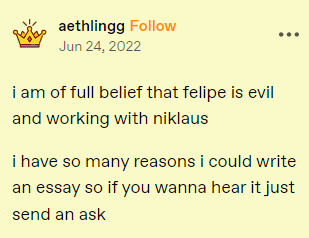
(post from aethlingg, his post can be found here! note: after research they no longer do jrwi content but rather qsmp content [specifically q!bbh and q!forever from what i noticed! theyre still very cool so go follow him [heres to hoping ik how he/they pronouns works btw])
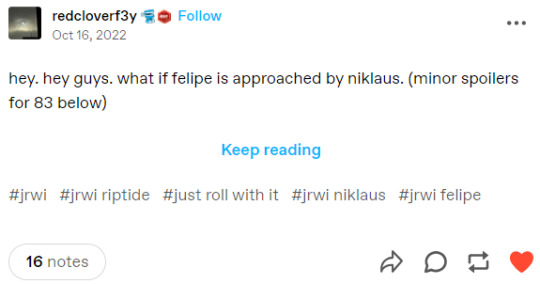
(post from redcloverf3y, their post can be found here! i cannot find if they still do post jrwi and just talk about other fandoms rn, but nonetheless go follow them!)
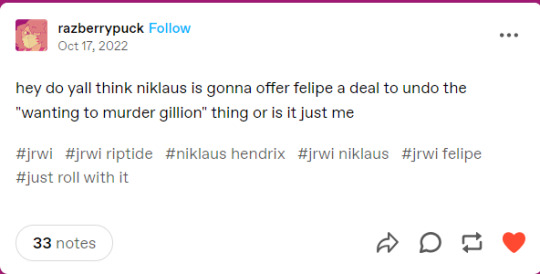
(post from razberrypuck, its post can be found here! they def are still into jrwi from their lil bio and shit, but theres also others things they post, like q!charlie [or qsmp in general] and stuff, follow it too!)
to theories of what demon actually got felipe:
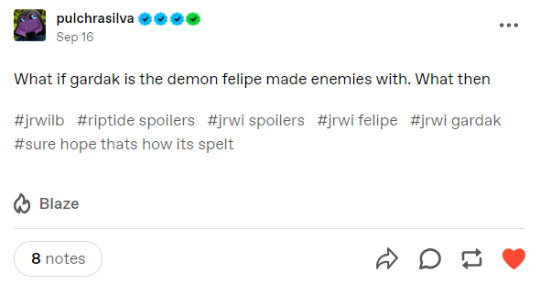
(post by pulchrasilva, their post [correct the pronouns if im wrong, i couldnt find anything on the blog] can be found here! considering how five or so minutes ago they made a jrwi post, they def still talk about it, as well as other things, go follow them!)
to even some on felipe BEING niklaus (which i reblogged and stuff):
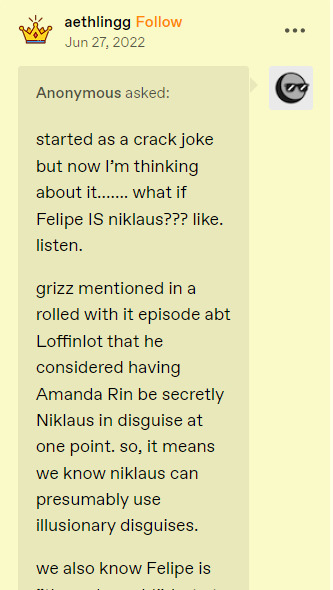
(post is from aethlingg again, this one can be found here! for once i cant get a full image because its a long one but ill be talking bout my tags on it too)
theres been 2 posts on how felipe wasnt the culprit (heres one by wrinklemcdinkle) (heres another by ralexsol) ive seen, so im throwing my own theory into the mix: the demon is kuba kenta and kk (or mr. kenta) has relations to both niklaus hendrix AND the compass. lets get into it!
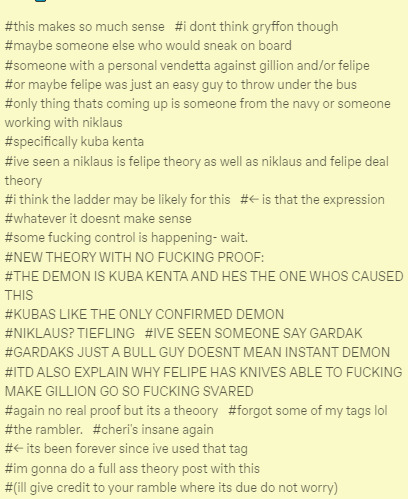
lets start with the tags i wanted to use (i found they werent actually on the felipe is nk post, but rather on the second felipe is being framed post i linked)! theres a couple details here i mention but why do i say kuba in particular?
the only person who could actually have something against gillion straight up is jayson ferin, mainly cause he got stabbed by him twice, but jayson isnt a demon! you know who is a demon though? kuba kenta. so for jayson, mr kenta was the perfect way.
as for felipe's escape, the rope was burnt, correct? who has fire powers again? mr ferin. when felipe was being investigated or whatever, kuba contacted jayson and he got him out of there, leaving there be reason to assume felipe was dragged to hell.
yes i do think felipe was controlled by kuba to hurt gillion, it plugs up some plot holes thats for sure. so how would felipe been target if he only pulled the card the next day? because felipe probably was a target since he was born.
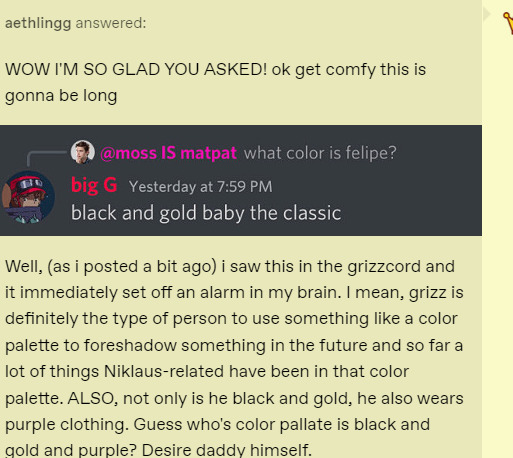
its important to point out the compass not only having effects like kk's scratches do (give nightmares, cause physical reactions/changes, etc), but a similar color pattern to both niklaus and felipe. (pointed out by several people before me, like aethlingg in his actual essay about evil felipe working with niklaus shown above) another interesting detail is the nk tattoo is used with a moon attached, felipe's choice of goddess to worship. he immediately finds a friendship with chip when about 4 eps ago, niklaus had been given a stick by chip (important cause of how it was harder to spy on niklaus since the stick was in his room and stuff before, i think itd also add in an idea of "greater connection with the person" and stuff). i could go on and on abotu their connections.
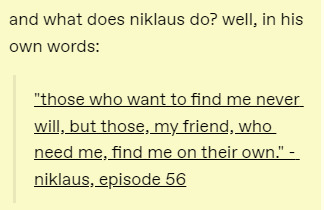
lets get back to the connection of niklaus and kuba. how would they even have met? probably something like chip did for his deal. as the quote above shows (found from the post by redcloverf3y, heres another link to it), people who have that desire for their goals will find him, not those who look for it. why would kuba need to strike a deal with desire daddy? because how else would he be able to use felipe. theres no way the curse would change the free will of felipe (it didnt do that for chip or gillion), so if he wants felipe to be a better puppet, he needs something to interfer with that. niklaus and kuba cut that deal, and felipe doesnt lose that curse on him, well to the others. kuba wouldnt have been able to give felipe the nightmares, anytime we see him hes with the three, so someone would have seen him get scratched! even if he got scratched in the couple months before they met him (cause felipe was six months old, not a couple days), the scars dont fade, rather theres the black ooze to them that burns, making it not a forgetable thing.
speaking of that, lets move onto the daggers situation. why the fuck would a tour guide have such dangerous daggers, poisonous ones to be exact (i heard it had poison effects somewhere, but sadly cannot find any info about that)? felipe has no need for poison daggers! he literally can spit acid! that means its only being used for its forgetfulness, which doesnt make too much sense to me since its not like being stabbed isnt just something you remember but theres the fucking pain of it too (example being, when i was younger and we were in the car getting ready to leave some place, there was this like tightness on my foot and i look at the door and [because it was one of those automatic doors and shit] it was closing on my foot. i didnt remember getting my foot in there and i still dont know how it happened, i do remember though how much of a bitch the pain was. not close to the pain of stabbing im sure, but you still remember the pain even without the memory of how it got there). that leaves one last usage: actually stabbing. again, hes a tour guide, he has no reason to need to stab people, no reason he should have a dagger that damaging, let along access to one like it. you know what has good weapons, ones with magic and shit? the navy. hell, theyre building a mechicanical leviathin! they of course have magic weapons for combat and such. and being a vice admiral, kk would have access to all of them. he gets a dagger for felipe, uses his deal to make sure felipe does whats needed, there.
so why would pulling the card get kuba as his enemy? its the magic of the cards! why would felipe hate gill? why would gillion dissappear only able to be brought back by powerful magic (whole can of worms for niklaus's abilities btw, needed to point that out)? the cards! theres also how felipe did reveal what his plans with gill were gonna be, but its probably just the cards.
i do also think the compass is related to kenta cause of their abilities being matched and it kinda fits him, a man driven even beyond the grave to reach a goal, even if that goal is only known by him...but this is long enough!
i hope i fed someones wants and if theres any contradiciting (or even more proving) evidence, lmk and ill try to counter it, bye and ill see you probably in a writing thing ive been putting off since this morning to write this
#i dont wanna tag people but if i should someone lmk#ALSO if someone wants me to remove their post from this you can lmk and ill fix it#tmr will so be a day of finishing up drafts#i dont mean my tumblr ones though#my ao3 public one aka#gills greatest enemy#yeah#lets do actual tags now#first my own#the rambler.#cheri's insane again#jrwishow#jrwi podcast#jrwi#jrwi show#jrwi riptide#just roll with it#jrwi spoilers#jrwi theory#dnd jrwi#jrwi felipe#i think ive been spelling kubas name wrong#jrwi kuba kinta#<- what the wiki says on spelling#oh well not fixing it#jrwi niklaus#niklaus hendrix#jrwi riptide spoilers#been a while since ive been on my good theory shit man#good for me
12 notes
·
View notes
Note
What’s an entertainment ban in China?
That's a really broad, vague question.
There are many entertainment restrictions in China, so this question could be answered in multiple ways depending on the context you're asking about.
Disclaimer: these are tricky, politically-charged topics, and verified information can be difficult or impossible to find. What follows is my understanding based on my study of this industry over the past few years, and will of course reflect my views and values. YMMV.
I think maybe the likeliest context you were asking about is the 'ban' around specific national days or events, when people do not share or discuss topics related to entertainment or other frivolous subjects out of respect for the occasion. Fans are asked not to post about their idol at that time, as it is a sign of irreverence and disrespect and can lead to trouble for that star.
There are a wide variety of restrictions around entertainment for censorship reasons. What people are allowed to do, wear and say, who is allowed to participate in particular types of roles, etc.
There are certain entertainers who, because of their behavior or the behavior of their fans, may be quietly or openly banned from certain types of public roles or appearances, or whose projects or status in the industry might be put on hold temporarily or permanently. The severity varies depending on the situation. Zhang Zehan is someone most readers will remember as being 'cancelled' fairly comprehensively in this way.
China's entertainment industry is tightly managed by the government, with a stated goal to help shape and guide the values and behavior of the population and embody communist ideals. Entertainers who are not deemed appropriate role models, or who show through fan behavior that they aren't able to appropriately guide people onto righteous paths will come heavily under the scrutiny/punishment of the government and of the public, so these things are not trivial concerns.
If an artist's fans don't properly observe national occasions, for example, and they post a lot and discuss a lot about their star on a national day of mourning or a date of significance to the party, they would be putting that star at serious risk of being cancelled both by the government and by the public.
Over the past few years the government has openly targeted fan culture and has been cracking down heavily on it. Fan groups are viewed as leading young people astray, causing major disruptions and problems, corroding social values and overall needing to be brought under control. Many restrictions, policies and statements from the government have been enacted toward this end.
The government takes a very dim view of any group that can rapidly mobilize based on shared ideas or values that are not government-sanctioned. LGBTQ groups have been heavily targeted in recent years for this reason. Pride parades are no longer allowed, and pro-LGBTQ groups have been shut down without any warning.
It's not because homosexuality is 'illegal' or 'banned' as many Westerners assume. Homosexuality is legal in China and there are even some limited rights afforded citizens and that benefit homosexual couples (more on that in Pie's excellent post). Rather, it's because of the threat to authoritarian power that large, impassioned movements can tend to represent.
This is actually why a lot of gay men who are turtles will avoid sharing their turtle status openly; because they don't want GG and DD to appear to be leading or inspiring a political movement.
Anyway, I hope this somewhat answers your question. If it doesn't, please feel free to write back with a more specific question.
A few related posts:
Nationalistic posts and why they shouldn’t be mined for candy - directly relevant to point 1.
Propaganda and false equivalence - relevant to point 2.
Politics in the fandom - relevant to all of this.
You can also explore the related tags for more on these kinds of topics. But make sure you do so directly from my blog (rather than from your news feed) or you'll get a bunch of unrelated posts from all over Tumblr.
#your political disengagement is a weapon against you#brotherhood and stuff#defined#sociopolitical analysis#ask
28 notes
·
View notes
Text
Final poll results, just a LITTLE skewed as several people noted in tags they clicked 'no' when they meant 'yes' because they were not expecting 'no' to be the first answer.
Of course is hardly a great sampling, accurate poll in any scientific ay, and so on but as I noted in a separate little babble post or two (well and some new stuff):
a) I am glad the folks who were ID'd or ID'd themselves as indigo children are such a small percentage.
b) Wow I never myself actually thought about how autistic kids would have been particularly targeted by this label and idea. I've never had it suggested I might be autistic, I just have a bucket of other neurodivergences that have been ID'd over time.
c) Apparently there are some songs out there I need to check out about Indigo Children
d) Yeah I understand how for some people it seemed a GOOD self-diagnosis idea even, it was while I believed in it, a sort of relief to me as well, because at first it just was the least *mean* reason I'd been given as to why I was so different in terms of it not being me at fault in some way, and as a kid who didn't fit well into various boxes deemed important and who was unsure of self worth, it felt nice at the time that maybe my life meant something or was doing some good, ya know?
e) Fistbumps, hugs, or whatever other welcome gestures of solidarity over the internet to everyone out there who was caught in the indigo children net and had their life or mental health impacted by it even a smidgen.
f) No one replied in tags as currently being called or thinking themself as an indigo child and I really don't know what I would say to someone in that particular boat, other than it's not a very good boat to be in for long and I hope you find a better boat someday?
@thebibliosphere has been talking about this again and I noticed in notes a bit of "oh no so this IS a thing other people went through" so... just curious.
I super lucked out that my mom believing and people convincing me I was an 'Indigo child' was a very short sentence in the paragraphs of my youth, so it didn't mess me up any more than dozens of other reasons given to me about how it was either my fault or my destiny to be the bullied and unloved/misunderstood one.
(Unlike @thebibliosphere most of my issues were social and mental health, not chronic physical health but yeeeeaaaah it's special looking back on being told you're even in emotional pain because it's kinda your job and destiny to feel and express the pain of others.)
534 notes
·
View notes
Text



Vecna's curse headcanons / symbolism

I have the need to make this post because supreme lack of narrative awareness and Simply Not Getting It are among the many, many issues with the ST fandom, but I do feel like its probably important to mention it here and I did eventually intend to repost my post about Vecna's curse to Henry's own blog and have been meaning to do that for well over a week now, lmao. Right now, though, this post will have to do because I'm low on spoons.
Vecna's curse, like most things surrounding Vecna / Henry in the fandom, is the subject of a pretty huge misconception so, yeah, I have to explain it here too. The idea the fandom has is that Vecna targets people who have trauma because he's evil and they're easy victims and he enjoys torturing them, along with the fact he chooses "children" because again, easy victims and he's also a [redacted].
Don't start me on the explicit homophobia and chronically online thinking it took for the fandom to reach that conclusion. But the thing is Vecna actually targets neither children nor does he target trauma survivors necessarily. The "special thing" about Vecna's curse is that its literally a blatant analogy for depression and suicide.
The canon is so heavy handed in this but for some reason the fandom still fails to get it 98% of the time. The feature of Vecna's curse and the common denominator among the victims is that the victim is carrying a "dark secret" that is taking a severe toll on them mentally and emotionally and quite literally ending their lives due to the shame and guilt surrounding this particular secret.
A big chunk of inspo here comes from DnD, where Vecna is renowned as the master of dark secrets. He's a keeper of knowledge. Which I've mentioned before, is another reason a lot of this fandoms theories about how Vecna's going to do xyz in season 5 are completely wrong and are based on a fundamental misunderstanding because Vecna's curse is not and has never been about Vecna exposing a victims "dark secrets" to anyone in the cast. We as the audience are only privy to them because obviously its relevant for us to see to understand the plot, but, yeah, ultimately Vecna doesn't expose anything about his victims outwardly where others would see it.
( With the exception kind of being Max, who naturally began to seek help for her struggle and once again, the depression / suicide analogy is very explicit here, but it wasn't Vecna who pushed Max to get this help or made her feel she had to look for help. Vecna's shtick is very much the opposite. Vecna's shtick is "come with me and it will all be over." There is no intention in Vecna's curse for the victim's secrets to be exposed to the surrounding cast in any way. )
Anyway, specifically Vecna's curse afflicts Chrissy because of her eating disorder + her mothers abuse. It afflicts Fred because of his survivors guilt. Max because of her feelings surrounding Billy's death, and Patrick because of his alcoholism + his fathers abuse. These are all "dark secrets" that were destroying their owners. But it doesn't end there. We're shown a brief moment of Vecna's curse manifesting itself - essentially we're shown Vecna "choosing a victim". In this scene we're shown a few people in Hawkins who have some type of secret, but ultimately the curse lands upon Patrick. Why ?
The answer lies in one of the most extremely overlooked scenes in the entire season, yet one of the most important ones we saw. Vecna is shown to have precognition. He can see and show others the future. This makes the analogy of Venca's curse as a suicide thing even more potent and literal because it heavily indicates the particular victims of Vecna's curse were not just depressed and having suicidal thoughts, they were actually actively headed toward committing suicide in the future. This is what ultimately "marked" them as sacrifices to open the gate.
So yeah. Vecna's curse is not necessarily about trauma nor is it actually about exposing or exaggerating anything traumatic the Victim has suffered. That being said, there is a lot of supernatural repetition in Vecna and his curse, and things he was a victim of and suffered in his human life sometimes reflect because of this and given he was a victim of serve abuse, trauma, guilt and shame, yes, often the victims have trauma and are heavily relatable to Vecna himself and Vecna's own personal experience. Which is a factor, I believe, in why Vecna often tries to soothe and reassure his victims in their final moments.
And tbh, I've mentioned this before in more in depth headcanons about Henry / Vecna and the themes / motifs surrounding him, but Vecna heavily mirrors a destroying angel, a grim reaper, ultimately an angel of death. I've repeatedly related him to figures like Azrael and Samael and will continue to do so because I'm Absolutely Correct, and that's very much his entire aesthetic and I think its crazy how people in this fandom insist on talking about things like IT/Pennywise and sometimes Freddy Kruger and their ( painfully wrong ) ideas of how they relate to Vecna as a character but absolutely no one wants to acknowledge for factor in Vecna's own namesake from DnD OR the main inspiration behind him otherwise which is Pinhead from Hellraiser. Its been blowing my mind since September.

0 notes
Text
If Toño would be out of commission for a bit, it would be prudent for him to stay somewhere safe – although Walter had absolutely no idea where the other man lived. Maybe he had his own place, concerned parents even. But laying low was probably the best course of action, especially after what transpired at the Academy. He still had no idea why their enemies had been so brazen as to attack within the Academy grounds. Most of their incursions had been away from highly populated areas, often attacking when someone was alone so that they would have less chances of being caught. Where they becoming desperate for some reason? Was there something happening that forced them to speed up the timetable for whatever they had in store?
“All I gathered was that the attacks had been on students from that particular Academy. People who excel in various fields – whether it’s just good grades or sports or art. That’s why I sang my way inside as a guidance counselor.” He would have access to the students but also to the teachers and everyone who worked there. Whoever was behind it was well-connected and had enough means and opportunities to target remarkable individuals. “I can’t say much for sure, but I feel the people were are searching for are faculty members of that Academy. Students do not possess the means to know everything about everyone. A teacher – however – would have access to student data and pick their targets for whatever reason that might be.”
A sigh abandoned Walter’s lips as he moved from the bed back to the window once more, taking a peak behind the curtain as he looked outside. The sea was calm for now. There was no raging storm in the horizon – which meant that for the time being, neither he nor Toño or Tacho would need to worry about an attack. “My idea was to investigate the faculty. See who could be acting suspicious. Once I would have identified a potential leak, the idea would be confront them and interrogate them. “ Maybe even his singing could affect whoever was behind that entire circus. That would make things a lot easier down the road. “Also…” His gaze turned to his guest and the cute dog by his side. Toño said he had no idea how long it would take for him to recover – so that was another puzzle piece that they needed to fix.

“Do you have a place to stay or do you want to stay here until you recover? It’s … not much.” It was a one bedroom apartment with a living room, a small kitchen and a bathroom with only room for a toilet, a sink and a shower. Not exactly the sort of place that could host several roommates. But if needed be –adjustments could be made. “You are welcome to stay for as long as you require to your recovery, of course. And in the meantime, I can always return to the Academy and see if there are some talks about what happened.” He doubted since he had cleaned that mess. “Or at the very least – see if someone is acting awkwardly post the attack. That could give us a clue where to look at next.”
Toño gazed at Walter with wonder and curiosity. He found it hard to believe that someone like him could possibly exist in a world where the paranormal was anything but. His heart stirred with excitement and curiosity, desperate to explore the unknown and seek out answers. At least now he had someone else he could talk to about these things. Someone else who shared his curiosity and desire for the truth.
For Tacho, the declaration from his owner shocked him. There was a vague sense of approval in his canine instincts and it took a moment for him to process it. He had been concerned that his owner was too reckless and impulsive, diving headfirst into danger without considering the consequences. The fact that they had made a powerful and mysterious ally like Walter was promising. At the same time, it worried him that there were so many questions left unanswered.
The pair stayed in the room for a moment, drinking in the new information and evaluating their next move. "Okay," Toño said with a sigh. "For now, all I can do is rest until the Paradox decides to release me. That should take a few hours. Or maybe a day, it depends." He had never been able to fully understand how the Paradox worked or what it was, only that it was a being from a higher plane of existence. Which meant it could do anything it wanted, its work was beyond the comprehension of mere mortals.
"In the meantime, I think it would be good if you could tell me everything you know about what's going on. I mean, this is clearly an issue of utmost importance and both our factions are just the tip of an iceberg, right?" At least that's how he had concluded. Maybe if both could share what they have learned perhaps some kind of plan could emerge that would bring them closer to success. "With two minds working together there's nothing we can't handle." Toño continued adjusting on the bed to sit up. At least that much he could do right now.
23 notes
·
View notes
Text
What A Civil War Is And Is Not
The idea for this particular episode was inspired by what’s going on over here in the United States. As I’m sure everyone knows, we had a coup attempt in January and there was a lot of talk of a new civil war and a lot of the traitorous morons who took part in the Jan 6th insurrection claimed they’re looking forward to a civil war and all that crap. And it got me thinking that even though we’re talking about the next civil war, we’re not actually talking about civil wars. What does a civil war mean? What do modern civil wars look like? Etc.
I will warn my listeners that I was an international relations major before I was a historian, so we will be discussing political theory during this blog post, but I’ll try to keep it to brief. I want to quickly define what a civil war is, discuss why they happen and why they’re so violent, and then highlight unique characteristics of a civil war.
What We Mean When We Talk About Civil Wars?
First, what are we talking about when we talk about civil wars?
Like most terms in political science, there are several ways to define a civil war. James Fearon in his article Iraq’s Civil War said a civil war was “a violent conflict within a country fought by organized groups that aim to take power at the center or in a region, or to change government policies.” Stathis N Kalyvas in his book The Logic of Violence in Civil War further refines this definition as “an armed conflict within the boundaries of a recognized sovereign entity between parties subject to a common authority at the outset of the hostilities.” Some scholars such as Ann Hironaka in her book Neverending Wars: The International Community, Weak States, and the Perpetuation of Civil War, add that at least one actor in the war must be the state. Jeremy M. Weinstein complicates the definition further by cataloguing civil wars based on, to paraphrase, whether the actors involved in the war want to capture the center, are fighting over secession, or violence is used but the belligerents have no interest in achieving territorial control of any sort. Other scholars have tried to add a numerical definition i.e., it’s not a civil war less than 1,000 people have died in the conflict and less than 100 people died on average per each year of the conflict.
For the purpose of this episode, we can understand a civil war as an internal conflict in which various actors (one of whom has to be a stand in for the state) shared a common authority and are now in armed conflict over a question of political control. An even simpler, but less academic, definition of a civil war is when the state, society, or portions of society attempts to kill itself in hopes of a new political outcome. When a state responds to a civil threat, it’s attacking its own people, targeting its own territory, and harming its own ability to function economically, politically, and socially. When a non-state actor responds to a civil war, whether they be insurgencies, rebels, whatever we want to call them, they are attacking their own communities, challenging their own government, and coercing or enlisting the help of their own families, friends, or neighbors. It is a war upon the self; however, you want to define the self, and in some cases, can be understood as state or social suicide.
Why do they happen?
Given the extremity of a civil war, why do they happen at all? There are a several theories, but the two most famous are the greed theory, the grievance theory, and the opportunity theory.
The greed theory championed by Paul Collier and Anke Hoeffler in their paper Greed and Grievance in Civil War basically argues that civil wars are caused by a combatant’s desire for self-enrichment and believe that war is the best way to gain control over goods and resources or increase one’s power within a given boundary. They argued that natural resources can contribute to the likelihood of conflict since natural resources, such as oil, can lower the startup costs of war or provide rebels with easy means to extend the war.
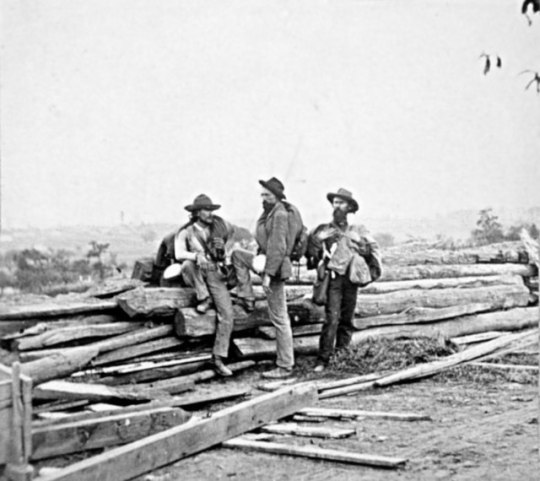
Confederate Soldiers Captured at Gettysburg
[Image Description: A black and white photo of three confederate soldiers resting against multiple, misshapen logs. They are all wearing slouch hats and great, mismatched uniforms along with rolled up blankets. behind them is the clear sky and the hills of Gettysburg]
The grievance theory argues that civil wars are caused by combatant’s sense of grievance against the state or the “other”. Opponents of the greed theory, such a David Keen, argue that greed and grievance are more intertwined than Collier and Hoeffler argue and that they can feed into one another. So really, we should think of it as the greed-grievance theory, where grievance can create opportunities for conflict which creates opportunities to enrich oneself which creates other grievances and so on. In his paper Incentives and disincentives for violence, Keen uses the conflict in Serbia to illustrate how the two feed into each other. Milosevic in Serbia used the media to create grievance amongst the Serbian population and create a common enemy. The elites around Milosevic encourage conditions that warranted international sanctions so they could create a black market where they controlled trade and could loot resources. Milosevic realized that if he ended the conflict, the sanctions would be taken away, and his black-market income would disintegrate. Thus, the stirring of grievances created an opportunity for elite enrichment that proved too precious to end.
The opportunity theory, championed by James Fearon and David Laitin, argues that civil wars likely if there are factors that make it easy for rebels to recruit soldiers and sustain insurgencies. They include poverty, political instability, rough terrain, and large populations as some factors that can increase the likelihood of civil war. Basically, if a state favors an insurgency there’s going to be a civil war.
I tend to agree with Keen that the greed model is too simplistic and even the greed-grievance model is narrow. Like Keen, I think they have to be incorporated into a theory that takes into account several other aspects of conflict generation such as some of the factors Fearon and Laitin identified as well as the perception of state control. All three theories seem to rely on this concept that if the combatants can benefit (whether that be economically, militarily, or politically) then they will risk civil war, but how can a non-state actor benefit if the state itself isn’t perceived as weak in some way? So, there must be a sense of state weakness combined with a sense of something not being gained or given on the part the belligerent actors, a something that was promised (whether as a normal function of the state or through an accepted social/state bias) that can only be gained through armed conflict.
Characteristics of a civil war
Now that we’ve gotten the theory out of the way, I want to spend the rest of the episode talking about common characteristics of civil wars.
Who are the combatants?
When talking about a civil war, the first tell-tale sign that it’s a civil war, are the combatants. Sometimes it can be easy to discern the combatants from each other like in the Irish Civil War, where it was the Free Irish State vs the anti-treaty IRA or the American Civil War where it was the Union versus the Confederates.
Sometimes it gets really complicated like during the Russian Civil War because, not only is it really a bunch of smaller civil wars rolled up into one, but because there isn’t a single point of state authority. You have the Red state versus the White state versus various separatist movements and insurgencies. That’s why I like Jonathan Smele’s book the “Russian” Civil Wars because in reality the only reason we call the civil war a Russian civil war is because all the peoples involved were once part of the Tsarist Empire.
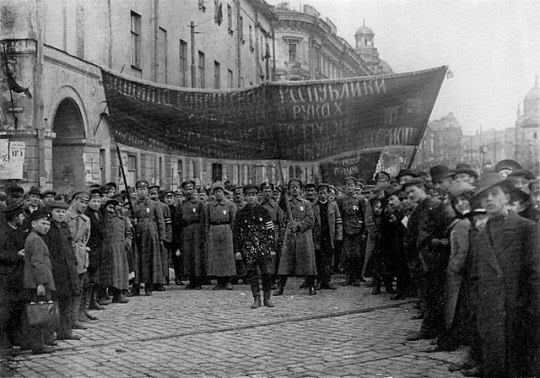
Red Army in Moscow, 1918
[Image Description: A black and white photo of a crowd gathered together in a city square. Two members of the crowd are holding up a banner with Russian writing. They are standing on a brick road. Behind them are several stone buildings.]
If we look at Central Asia, we have Red and White forces battling each other, but we also have fragile semi-states who are also fighting each other whether it be the Tashkent Soviet, the Kokand Autonomy, or the Alash Autonomy or the two remaining emirates: Khiva and Bukhara, plus the Basmachi, a guerrilla movement that wanted to preserve what they deemed to be a proper Islamic society. Then to make matters even more confusing, once the Reds defeated the Whites, they rely on the local state actors to restore order, and with their help overthrow the emirs, but eventually turned on those same state actors, wiping out all they deemed as dangerous and replaced them with state actors of their own choosing. This cannibalization isn’t unusual to see in civil wars and more times than not it occurs amongst the non-state actors. For example, during the Tajik Civil War of 1994, after the Kulob militia were elected to power they turned on an array of rebel groups including the Islamic Renaissance Party of Tajikistan and the Pamirs from Gorno-Badakhshan, which then turned into a nasty bit of ethnic cleansing-which is also common in civil wars.
Identifying combatants can also be complicated because of external interference. We’ll get into this a little later in the episode, but a perfect example of this is the current Syrian Civil War: where Asad’s government is fighting against the various Syrian rebel groups, but the Syrian rebel groups also have to content with Hezbollah, Iranian forces, Russian Forces, and the Islamic State.
Type of Warfare
The type of warfare most commonly seen with civil wars is guerilla warfare or insurgent warfare. Basically, small groups of combatants use tactics such as ambushes, sabotages, raids, hit and run tactics, and petty warfare to attack conventional, less mobile forces. So, Nathaniel Bedford Forrest’s raids during the American Civil War or the Basmachi attacks during the Central Asian Civil Wars.
Often times the insurgents avoid standing battles because they will never win those battles. Instead, they use the terrain to launch hit and run attacks, ambushes, and raids, relying on their small, but highly mobile units to wear the conventional army down.
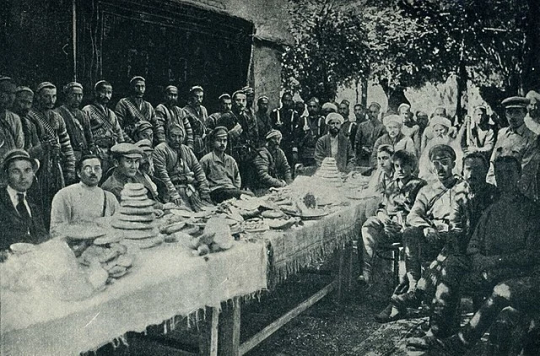
Negotiations between Soviet soldiers and the Basmachi
[Image Description: A black and white photo of a crowd of men sitting and standing around two long tables placed together. Some of the men wear turbans and skullcaps and long robes and long dress shirts while others are wearing the grey shirts and caps of the Bolsheviks. Two clothes are spread across the two tables with several plates of food. The men are sitting in a courtyard with a tree providing shade.]
They’ll also target governmental and military officials as well infrastructure such as supply lines, important governmental or symbolic buildings, and centers of commerce-meaning civilians are also targets. The Provisional IRA turned this into an art as they planted car bombs in large shopping areas. We’ll get into the tricky relationship between insurgents and the population a little later in the blog post, but it should be clear that both the state and the non-state combatants will target civilians when it suits their purposes.
Governments respond by using standard counter-insurgency tactics such as population control i.e., draining the swamp. Expanding zones of control, also known as oil spots, cordon and search operations, winning the hearts and minds of the people, scorch earth tactics, and intelligence operation which includes intelligence gathering, counterintelligence efforts, and assassinations. The Government can also call-in conventional units and tactics such as heavy bombardments, air power, and special forces. Basically, the government doesn’t care how it wins as long as it wins, so it will simultaneously implement conventional tactics and counter-insurgency tactics-sometimes to its own detriment. A good example of this might be the Soviet-Afghan War or the Vietnam War, although those are perfect examples of how extreme external meddling can drastically change the course and duration of your civil war.
I also want to acknowledge that in modern civil wars like in the current Syrian or Yemen Civil wars, governments are growing less and less concern about civilian casualties. While civilian loss is a staple of civil wars, in Syria we’ve seen Assad deploy chemical weapons, which are banned by international law and he has purposely targeted medics and medical infrastructures. Or the purposeful starvation of Yemeni people in their civil war. The accepted “standards” of law are being increasingly abandoned and states are using civil wars to do whatever the hell they want to civilians and rebels with the goal of terrorizing their own people as much as defeating the rebels. This has sort of always been an aspect of civil war, but I would argue that the concept that you need to defeat your own people-even the civilians who are not active-is a new 21st century twist.
Atrocities and violence
Which of course leads us to atrocities. Civil Wars are known for their atrocities and there are hundreds of papers and books studying why civil wars are so violent and bitter and is the violence random or does it follow a pattern, etc. Atrocities always occur in war, but during a conventional war, you’re hurting people who have nothing to do with you. It’s an other, an alien, someone from another country and culture, etc. But with a civil war, no matter how “othered” the enemy becomes, it’s still a neighbor or a family member and so there is this question: why do people get so violent during civil wars? And the disquieting answer is that: the monopoly of power is broken during a civil war. So, in a stable government whether you’re a democracy or a dictatorship, there’s an understanding between government and people: do these things or be these things and the chances of state violence against you will be low.
Now I’ll acknowledge that there is randomized terror, such as the Soviets perfected or any modern-day dictator, but even dictators, or the ones who want to survive, know that there is a balance between being a crazy maniac that people will risk everything to overthrow and the right amount of violence to maintain absolute control. As long as this agreement holds, the state has monopoly over violence. But something happens where this monopoly ends-or it’s perceived to end-and other non-state actors now have the ability to employ violence to maintain control of their areas. And so, violence becomes the new political, economic, or social currency. Kalyvas, in his book the Logic of Violence in Civil War argues that civil war violence isn’t random, it only occurs in disputed territories (where the monopoly of violence is most tenuous) and is driven, not by the conflict itself, but by old rivals and wounds in the population.
Which brings us to another reason why civil wars can be so violent: civil wars exasperate existing tensions. Whether it be class based, race based, or religion based, if there is a problem plaguing your society, a civil war will make it worse. We see this in Central Asia. Take the Tsarist government away and the tensions between the settlers and the indigenous peoples explodes into a conflict, the internal conflicts within the indigenous peoples explodes into various conflicts, the white and red-the supporters of the status economic and political quo and those who want something different-take their conflict into the region. We can see this in Syria with Alawites pitted against the Sunni peoples, the Ismaili as well as against the Kurds and the Druze, and so on. During the Irish Civil War, it wasn’t just an IRA man against an IRA man, one of the main grievances was the influence of the British in the Cosgrave government as well as the reincorporation of the Unionists or loyalist, who didn’t support the IRA during the Irish War of Independence.
So, civil wars are violent, but who is on the receiving end of that violence? It’s mostly civilians which makes sense since the non-state combatant’s best way to survive is to avoid open warfare and the state government has a hard time finding the non-state aggressors. So, who’s caught in the middle? The civilians.
Non-state combatants employ violence to either punish perceived collaborators or enemy agents, to increase the price of continuing the war (i.e., terrify and anger civilians so much by indiscriminate violence that they demand their government end the conflict now), to get revenge/attack “hated” peoples, and/or to extort the population of their support, their people, and/or their resources. Jeremy M. Weinstein, in his book Inside Rebellion: The Politics of Insurgent Violence argues that insurgents that control lands rich in natural resources or are financed by external forces are more likely to commit high levels of indiscriminate violence than those in resource poor regions. Which makes sense. If you need to rely on civilians for support, supplies, and resources, you’re not going to want to anger them whereas if you can just extract your wealth or are being supported by an external force, why care about the people under your care? Then there’s ethnic cleansings/acts of genocide. The Russian Civil War is full of moments were non-state actors would attack their favorite people to hate whether that be the Jewish people of their region, the indigenous people of Central Asia, or just old fashion peasants.
And then there are cases where attacks led to unintended casualties or more civilian casualties than expected. This happened a lot with the Provisional IRA’s bombing campaigns.
The government targets civilians for similar reasons. They want to punish anyone who supports or aids the rebels, they want to increase the price the rebels have to pay to engage in a specific region (ala Sherman when he burned the south), and/or they need to reassert control. Civilian targeting can also be a component of intelligence efforts as they try to take away all support from the rebel groups. Similarly, the state can also engage in ethnic cleansing/acts of genocide. Again, during the Russian Civil War, both the Red and White armies engaged in launching pogroms against their Jewish populations or the bloody work of the Yurchiki during the Tajik Civil War. The Yurchiki was a Russian based unit sent to Tajikistan to assist the government and are responsible for so many atrocities it is rumored even European human rights organizations played them down. And just like an insurgency, the state can also have unintended casualties or more civilian casualties than expected. As I mentioned earlier, in civil wars like Syria, the civilian is purposely and indiscriminating targeted and it’s hard to understand what Assad thinks he’s achieving by targeting hospitals and medics and civilians in pro-Assad regions.
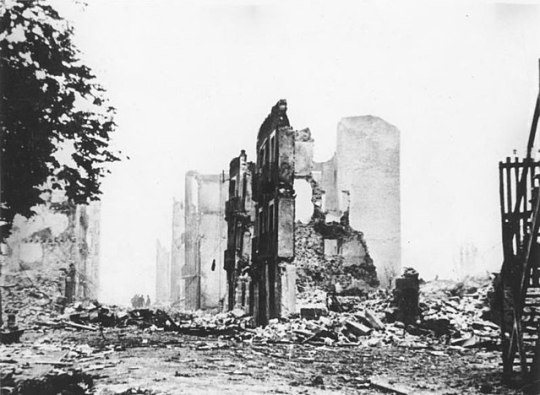
Destroyed remains of Guernica during the Spanish Civil War
[Image Description: A black and white photo of several demolition buildings. Piles of building rubble fill the streets and smoke is thick in the air.]
However, civilians aren’t the only ones who experience atrocities. Soldiers and governmental officials are also common targets which means that they too can be victims of extreme violence. During the Irish Civil War, the anti-treaty IRA assassinates Free State officials such as TD Sean Hales as well as Pro-Treaty family members such as William Cosgrave’s uncle and Kevin O’Higgins’s father. The Fort Pillow massacre during the American Civil War is a prime example of killing prisoners after they’ve surrender, a horrific act of extreme racism, and an attempt to intimidate supporters of the Union. In short, Forrest led an attack on Fort Pillow and won. He massacred 300 African-American soldiers refusing to treat the soldiers as traditional prisoners of war.
Governmental forces are no different. During the Irish Civil War, the Cosgrave administration legally executed 77 prisoners of war while members of the Free State army implemented their own executions. The most famous case being the landmine of Ballyseedy. Nine IRA prisoners were tied to a landmine which was detonated and only one prisoner survived. During the Russian Civil War, the Bolsheviks and the Whites implemented their own Terrors, where they carried out extreme forms of political repression and mass killings. Violence isn’t only physical violence, it can also be the taking and redistribution of property, mass expulsions, and forced conscription of people or food. For example, during the Central Asian Civil Wars, the Jadids and Bolsheviks took all property from the Ulama, breaking their source of power and leaving them homeless and without resources.
External Interference
Like all other wars, external actors love getting involved. A civil war opens your country up to external meddling whether it be financial support, international investigations into the conduct of the war, or military support. In the Irish Civil war, the British government gave artillery to the Free State so they could defeat the anti-treaty IRA troops barricaded in the Four Courts, during the American Civil war, England and France considered supporting the Confederates, during the many civil wars that make up the Russian Civil War, Britain and the United States got involved in all sorts of way, and in the Libyan, Syrian, Yemeni, and every other current civil war, Russia, the United States, and usually Iran are involved.
What does this mean for a civil war? Well, that depends. Sometimes external interference can mean that one or more of the actors are recognized as legitimate. It can pressure the state to find peace or it can empower the state to keep fighting. Often times external actors can muddle a civil war, they can extend a civil war, and they can turn civil wars into proxy wars, like the Soviets in Afghanistan, the United States in Vietnam or Korea, or the Russians ever growing presence in Syria. Syria is not quite that bad yet, but Russia is heavily involved and can serve as a stand in for state power in many different ways. External actors can also feed into rebel’s worst natures. For example, if they make a rebel group financial independent, then we may see rebel groups engage in indiscriminate violence.

The Provisional Government bombing the Four Courts, using ammunition supplied by the British
[Image Description: A black and white picture of a river and the streets on either side of the river. The river is calm. The streets are mostly empty and there are several buildings on each side. A stone bridge ran across the river, connecting the two streets. A large grey and white cloud billows in the distance, taking up most of the sky.]
And finally, civil wars are great ways for most powerful states to experiment with new systems and tools of warfare without technically being in a war themselves. The most famous example of this, of course, is the Spanish Civil War which the Nazis and Soviets turned into their own experiment lab for tactics and weapons they’d used during WWII. And I think we’re seeing some of this in Syria, Yemen, and even the current Ukraine conflict which is a weird hybrid civil war of sorts.
Long-lasting Effects
One of the most damaging characteristics of a civil war is the long-last effects. Because a civil war is so violent, because the people themselves are the target, and because it can invite outside intervention, civil wars rarely end when the fighting stops. Civil Wars change entire physical and political landscapes. Civil Wars can ruin farmland which may lead to mass starvation that can last for years if not decades, can eliminate industrial capabilities, and can redistribute control over resources and economies.
Civil Wars can overthrow the ruling powers but can also enrich them and strengthen their hold. They can fundamentally change how people understand their political systems or they can enforce existing structures including inequalities. Civil Wars exasperate social and economic tensions within a sovereign entity and I don’t think a Civil War has ever made them better. They’ve only made them worse, which can contribute to future conflicts or ethnic cleansings.
Civil Wars can change international politics, making certain states more reliant on others, weakening external actors in surprising ways, and pulling entire regions into a death spiral of civil wars and interstate wars.
Civil Wars can wipe out entire peoples and their culture, fundamentally reshaping a nation’s demographic and identity. They also create massive refugee and humanitarian aid crises. And even if the surviving authority maintains to weather all of these long-lasting effects the trauma their society has endured does not end. It gets passed down each generation and can become a festering wound that may not kill the state, but can weaken it.
In his book, the Logic of Violence in Civil War Kalyvas writes this fascinating passage:
“This book introduces a different mechanism for mapping national-level cleavages onto the local level, one that is consistent with the observed disjunction between center and periphery: the mechanism of alliance entails an exchange between local and supralocal actors, whereby the latter offer the former military muscle so that they can prevail in local conflicts; in return, local actors supply central ones with essential local resources that help them wage the war. Myriads of local conflicts are thus linked to the overarching conflict of the civil war – its “master cleavage.” Seen from this perspective civil war is, at its core, a process of integration and state building.” - Stathis N. Kalyvas, The Logic of Violence in Civil War, pg. 14
Basically he’s talking about the relationship between the actors at the center and local actors and, how even though local actors engage in violence at contested locations and usually engage only to settle old scores and for local political reason, the act of violence is dependent on the central and local actors working together and thus shapes the direction of the war, often times reshaping boundaries, even if they’re just local boundaries, and thus it becomes an act of statecraft and integration.
It’s probably no surprise but the idea of civil war as a tool of state building fascinates me. I love to study asymmetrical conflicts at the point where non-state belligerent actors must transition from warfare to statecraft and we’ll actually be discussing that process in this current season because that’s exactly what the Bolsheviks and Jadids have to do during the civil war. And it’s something we’ll return to when we cover the Irish Civil War. But this concept of civil war equals state building is fascinating because I think we often think of civil wars as inherently destructive and terrible things, which they are. Just go back to our discuss about the atrocities committed during civil wars if you need to confirm that they are indeed terrible. But it’s also interesting to think of the ways that new institutions and centers of power are crafted by civil wars and if we focus on the few productive things that can come out of civil wars, then can we find a way to resolve them, not only quicker, but in a more peaceful and long-lasting way. Or can we at least craft tools that either the state itself or the international community can put in place to prevent civil wars from becoming destructive, violent, suicidal conflicts?
This idea reminds me of one of my favorite passages from Tadeusz Konwicki’s book a Minor Apocalypse, “the world can’t die. Many generations have thought the world was dying. But it was only their world which was dying.”
Resources
Iraq’s Civil War by James Fearon
The Logic of Violence in Civil War by Stathis N. Kalyvas
Neverending Wars: The International Community, Weak States, and the Perpetuation of Civil War by Ann Hironaka
Greed and Grievance in Civil War by Paul Collier and Anke Hoeffler
Incentives and disincentives for violence by Dan Keen
Ethnicity, Insurgency, and Civil War by James Fearon and David Laitin
Inside Rebellion: the Politics of Insurgent Violence by Jeremy M. Weinstein
A Minor Apocalypse by Tadeusz Konwicki
Strategy by B. H. Liddell Hart
Learning to Eat Soup with a Knife by John A. Nagl
The Russian Civil Wars 1916-1926 by Jonathan Smele
Destroying a Nation by Nikolaos van Dam
Syria After the Uprising by Joseph Daher
The Soviet-Afghan War: How a Superpower Fought and Lost by the Russian General Staff
The Hidden War by Artyom Borovik
Russia in Flame: War, Revolution, Civil War, 1914-1921 by Laura Engelstein
Imperial Apocalypse: the Great War and the Destruction of the Russian Empire by Joshua A Sanborn
A Nation and not a Rabble: the Irish Revolution 1913-1923 by Diarmaid Ferriter
Judging W. T. Cosgrave: the Foundation of the Irish State by Michael Laffan
Say Nothing: a True Story of Murder and Memory in Northern Ireland by Patrick Radden Keefe
Making Uzbekistan: Nation, Empire, and Revolution in Early USSR by Adeeb Khalid
Green Against Green by Michael Hopkinson
#history blog#civil wars#irish civil war#american civil war#spanish civil war#central asian civil wars#russian civil war#asymmetrical warfare#queer historian#activating political science powers#Spotify
0 notes